- Applying to Uni
- Apprenticeships
- Health & Relationships
- Money & Finance
Personal Statements
- Postgraduate
- U.S Universities
University Interviews
- Vocational Qualifications
- Accommodation
- Budgeting, Money & Finance
- Health & Relationships
- Jobs & Careers
- Socialising
Studying Abroad
- Studying & Revision
- Technology
- University & College Admissions
Guide to GCSE Results Day
Finding a job after school or college
Retaking GCSEs

In this section
Choosing GCSE Subjects
Post-GCSE Options
GCSE Work Experience
GCSE Revision Tips
Why take an Apprenticeship?
Applying for an Apprenticeship
Apprenticeships Interviews
Apprenticeship Wage
Engineering Apprenticeships
What is an Apprenticeship?
Choosing an Apprenticeship
Real Life Apprentices
Degree Apprenticeships
Higher Apprenticeships
A Level Results Day 2024
AS Levels 2024
Clearing Guide 2024
Applying to University
SQA Results Day Guide 2024
BTEC Results Day Guide
Vocational Qualifications Guide
Sixth Form or College
International Baccalaureate
Post 18 options
Finding a Job
Should I take a Gap Year?
Travel Planning
Volunteering
Gap Year Guide
Gap Year Blogs
Applying to Oxbridge
Applying to US Universities
Choosing a Degree
Choosing a University or College
Personal Statement Editing and Review Service
Guide to Freshers' Week
Student Guides
Student Cooking
Student Blogs
- Top Rated Personal Statements
Personal Statement Examples
Writing Your Personal Statement
- Postgraduate Personal Statements
- International Student Personal Statements
- Gap Year Personal Statements
Personal Statement Length Checker
Personal Statement Examples By University
Personal Statement Changes 2025
- Personal Statement Template
Job Interviews
Types of Postgraduate Course
Writing a Postgraduate Personal Statement
Postgraduate Funding
Postgraduate Study
Internships
Choosing A College
Ivy League Universities
Common App Essay Examples
Universal College Application Guide
How To Write A College Admissions Essay
College Rankings
Admissions Tests
Fees & Funding
Scholarships
Budgeting For College
Online Degree
Platinum Express Editing and Review Service
Gold Editing and Review Service
Silver Express Editing and Review Service
UCAS Personal Statement Editing and Review Service
Oxbridge Personal Statement Editing and Review Service
Postgraduate Personal Statement Editing and Review Service
You are here
- Mature Student Personal Statements
- Personal Statements By University
- Accountancy and Finance Personal Statements
- Actuarial Science Personal Statements
- American Studies Personal Statements
- Anthropology Personal Statements
- Archaeology Personal Statements
- Architecture Personal Statements
- Art and Design Personal Statements
- Biochemistry Personal Statements
- Bioengineering Personal Statements
- Biology Personal Statements
- Biomedical Science Personal Statements
- Biotechnology Personal Statements
- Business Management Personal Statement Examples
- Business Personal Statements
- Catering and Food Personal Statements
- Chemistry Personal Statements
- Classics Personal Statements
- Computer Science Personal Statements
- Computing and IT Personal Statements
- Criminology Personal Statements
- Dance Personal Statements
- Dentistry Personal Statements
- Design Personal Statements
- Dietetics Personal Statements
- Drama Personal Statements
- Economics Personal Statement Examples
- Education Personal Statements
- Engineering Personal Statement Examples
- English Personal Statements
- Environment Personal Statements
- Environmental Science Personal Statements
- Event Management Personal Statements
- Fashion Personal Statements
- Film Personal Statements
- Finance Personal Statements
- Forensic Science Personal Statements
- Geography Personal Statements
- Geology Personal Statements
- Health Sciences Personal Statements
- History Personal Statements
- History of Art Personal Statements
- Hotel Management Personal Statements
- International Relations Personal Statements
- International Studies Personal Statements
- Islamic Studies Personal Statements
- Japanese Studies Personal Statements
- Journalism Personal Statements
- Land Economy Personal Statements
- Languages Personal Statements
- Law Personal Statement Examples
- Linguistics Personal Statements
- Management Personal Statements
- Marketing Personal Statements
- Mathematics Personal Statements
- Media Personal Statements
- Medicine Personal Statement Examples
- Midwifery Personal Statements
- Music Personal Statements
- Music Technology Personal Statements
- Natural Sciences Personal Statements
- Neuroscience Personal Statements
- Nursing Personal Statements
- Occupational Therapy Personal Statements
- Osteopathy Personal Statements
- Oxbridge Personal Statements
- Pharmacy Personal Statements
- Philosophy Personal Statements
- Photography Personal Statements
- Physics Personal Statements
- Physiology Personal Statements
- Physiotherapy Personal Statements
- Politics Personal Statements
Psychology Personal Statement Examples
- Radiography Personal Statements
- Religious Studies Personal Statements
- Social Work Personal Statements
- Sociology Personal Statements
- Sports & Leisure Personal Statements
- Sports Science Personal Statements
- Surveying Personal Statements
- Teacher Training Personal Statements
- Theology Personal Statements
- Travel and Tourism Personal Statements
- Urban Planning Personal Statements
- Veterinary Science Personal Statements
- Zoology Personal Statements
- Personal Statement Editing Service
- Personal Statement Writing Guide
- Submit Your Personal Statement
- Personal Statement Questions 2025
- Personal Statement Changes 2024
Our psychology UCAS personal statement examples below will inspire you to write your own unique statement, and help you understand how students have successfully applied for a psychology degree in the past.
What else can I find on this page?
What is a psychology personal statement?
How do i write a psychology personal statement, what should i include in my psychology personal statement.
- How do I write my psychology personal statement introduction?
How do I write the conclusion for my psychology personal statement?
What can i do with a psychology degree.
- What are the best UK universities for psychology?
A psychology personal statement is a creative piece of writing that demonstrates your skills, experience and hobbies/extracurricular activities and how they relate to a degree in psychology.
Psychology has always been a popular and therefore competitive subject, so you need to make sure your statement stands out from the crowd and is as polished as you can make it.
At Studential, we always recommend students start by making a series of notes about themselves, which they can then use to put together a coherent personal statement. These should include:
- Specific aspects of the course that interest you
- Examples of coursework or projects you have completed
- Books, articles, etc. you have read related to the subject area
- Work experience or voluntary work in this area
- Conferences you have attended
- Personal experiences that sparked your interest in this subject
- What you hope to do once you have completed your degree in terms of your career
- Experiences that show you are a reliable and responsible person, e.g. part-time job, small business enterprise, community and/or charity work, sixth form committee, helping out at school events, etc.
You also need to think about your interests and skills, such as hobbies, other languages you speak, etc. as well as your plans for a gap year (if you're planning on taking one).
Once you have written all these down, you think about your opening paragraph, and begin to get something down. It's a good idea to allocate at least one paragraph to each bullet point to make sure you've covered everything.
When you have your first draft in place, you can revise it and ask your family, friends and tutors for help. Incorporate any feedback, comments and suggestions they offer, and see if they improve your statement.
Keep redrafting until you feel it's as polished as possible - remember, you'll be facing some stiff competition!
- The main aim of your personal statement is to show the admissions tutors why they should pick you to attend their course and university.
- Look at the course content and link it to your personal qualities, future goals and achievements. For example, you might have done some work shadowing at a counselling clinic or peer mentoring at your school or college.
- If you're applying for a joint honours, make sure you cover both subjects in the course.
- For those applying for a postgraduate course, draw attention to any clinical work experience you've completed to demonstrate your expertise and knowledge in the subject.
- Read our psychology personal statement examples above for inspiration on how to make yours a success (please don't plagiarise them!).
- Remember to avoid using cliches, over-used words or phrases, humour, jokes, or taking any political or religious viewpoints.
- Structure it with a clear introduction, middle and end. You only have 4,000 characters to sell yourself, so try to make every word count!
For more help and advice on what to write in your psychology personal statement, please see:
- Personal Statement Editing Services
- Personal Statement Tips From A Teacher
- Analysis Of A Personal Statement
- The 15th January UCAS Deadline: 4 Ways To Avoid Missing It
- Personal Statement FAQs
- Personal Statement Timeline
- 10 Top Personal Statement Writing Tips
- What To Do If You Miss The 15th January UCAS Deadline.
How do I write a psychology personal statement introduction?
We recommend starting your psychology personal statement with either a story about how you came to be interested in the subject, or picking one or two aspects that you particularly enjoy and why you find them interesting. For example, the following applicant has chosen to talk about their childhood, and the consequences of their behaviour:
"Psychology encapsulates every aspect of our lives. From childhood, the reasons behind why we do what we do has fascinated me; and when I was disciplined for the type of mischief that one commits at a young age, my reasoning for my actions were always “To see what would happen.”
My parents mistook this as an act of mindless disobedience whereas it was in fact my first attempt at social psychology. Then, as I further discovered the leading figures in psychology, my knowledge and love of the intricacies of the human and animal mind grew."
These introductory paragraphs explain why the candidate is keen to pursue a course in psychology at university, while at the same time relating an engaging anecdote from their past, which helps to draw the reader in and make them want to read on further.
Another applicant who has submitted their statement to Studential has decided to talk about their Uncle, who has Asperger's Syndrome, and how they wondered why he was so different from everyone else:
"It was the odd behavioural traits displayed by my uncle, who has Asperger’s syndrome that first generated from a young age my questioning about why he acted so ‘differently’ to the rest of us.
This was part of what led to my interest of studying psychology, as it made me question how and why humans are so disparate from one another, and what part the brain plays in running our everyday lives."
Again, this provides an interesting hook for the reader, while demonstrating why they want to study psychology at a higher level.
These two examples should give you a good idea of how you might go about writing your own unique introduction to your psychology statement, but if you feel you need further inspiration, take a look at our list of over 100 psychology personal statement examples for more ideas.
To round off your personal statement, we suggest a paragraph or two about your extracurricular activies and hobbies, and how they have helped you to develop skills that will aid you with your psychology course at university. You may also wish to include a short sentence or two about your future ambitions or career plans, and how a degree in psychology will help you achieve these.
For example, this applicant has chosen to conclude their statement by talking about their current work experience and how it has improved their communication skills, along with their desire to complete a PhD once they've finished their undergraduate degree:
"I currently help people who struggle with language barriers by being a Spanish interpreter in different fields. Observing people from different age and cultural groups gave me first-hand experience considering the effects of stress due to the inability to communicate. This has, in addition to improving my communication skills, taught me how to deal with people from different social groups. I believe these interpersonal skills are valuable in the world of psychological research, in order to build rapport with participants in certain contexts. It has also taught me tolerance for others and the ability to remain poised during stressful situations. To culminate, in regards to my future career plans I would like to remain in further education and do a Phd in psychology- a step forward in my desired career as a researcher."
As another example, you can see how a candidate below chooses to talk to about their work experience with elderly people that have dementia, and how they want to improve their knowledge of the brain and their problem-solving skills:
"Subsequently, I did work experience at St Peter's residential care home. During my placement, I worked with nurses and kitchen staff to provide quality service to the elderly. I assisted in serving tea and lunch and also interacted with the elderly during social activities. This helped me to know how to interact with elderly people with dementia and gain a different perspective on elderly people.
I want to study psychology to further develop my knowledge in the scope of the brain, its anatomy and how it works. I want to learn how to work through problems carefully and logically applying scientific principles. Furthermore, I want to expand my awareness in all the different fields involved in the course, so that I can master any situation that I am presented with in my chosen field."
However you decide to conclude your statement, always try to relate it to the course you are applying for, i.e. psychology, and end on a positive, enthusiastic note that will make the admissions tutor want to make you an offer.
For more inspiration on how to write a conclusion, please take a look at our psychology personal statement examples .
For those with a psychology degree, there are many career options available, including:
- Clinical psychologist
- Counselling psychologist
- Educational psychologist
- Forensic psychologist
- Further education teacher
- Health psychologist
- High intensity therapist
- Occupational psychologist
- Psychological wellbeing practitioner
- Sport and exercise psychologist
Other career paths where a psychology degree could be useful include:
- Advice worker
- Border Force officer
- UCAS Careers advice
- Chaplain
- Counsellor
- Detective
- Education consultant
- Human resources officer
- Life coach
- Market researcher
- Mediator
- Neuroscientist
- Play therapist
- Policy officer
- Psychotherapist
- Special educational needs coordinator (SENCO)
For more help and advice on psychology careers, please see Prospects and the British Psychological Society .
What are the best universities for psychology?
Currently the best UK universities for studying psychology at are:
| 1. | |
| 2. | |
| 3. | |
| 4. | |
| 5. | King's College London |
| 6. | |
| 7. | Bristol |
| 8. | University of Exeter |
| 9. | Durham University |
| 10. |
For more information about UK university rankings for psychology, please see The Guardian and The Complete University Guide .
Related resources
How to apply for a psychology degree.

Find out more
UCAS Pyschology Guide

Psychologist Careers

Types Of Psychology Degree

Psychology Personal Statement Writing

How to Create your Personal Statement for Psychology
Sponsored school(s).
Odds are, if you are at the stage of writing a personal statement, then you are more than likely preparing applications for graduate schools in psychology. Below find out what it is, why you need one, and get some pointers on crafting a personal statement that will put your best foot forward with the admissions committees.
What is a Personal Statement?
Commonly referred to as a “statement of purpose”, and by some as an “application essay”, a personal statement is your opportunity to introduce and sell yourself to a desired graduate program or college . In most cases, the personal statement can serve as the defining factor that allows students to stand out in a pool of applicants with equally high GPAs and test scores. Plus, a stellar statement of purpose could also help the applications of students who have unfavorable scores and grades.
Before You Begin…
Consider the type of personal statement required of you:.
Personal statements can range from a few paragraphs to several one-page essays that address different topics. They will vary widely between programs and schools, which means that you might craft quite a few of these application essays if you seek admission into various programs.
The objective of these statements all share a common thread: for the graduate committee to get a clear understanding of your career and academic aspirations as well as a sample of your writing abilities (a skill of utmost importance for comprehensive graduate study).
If Topics Are Chosen By You
The specific expectations of a statement of purpose might vary. Some schools might leave the direction and objective of the essay up to the applicant. In cases, you have the freedom to choose what you write about although, as a rule of thumb, essays should take on a professional/ academic focus rather than be personal or autobiographical. Don’t confuse personal statement with a long essay about your life growing up.
Instead, demonstrate your best attributes by outlining your fit, interests, previous experiences, servant leadership, research and courses you have taken that affirmed your dedication to the field of study. If you were not given specific questions, then be sure to touch bases with all of these that are relevant to your background in a logical and consistent manner.
If Topics Are Chosen By the Program
Other schools may provide you with a list of specific questions to answer pertaining to your career objectives and how obtaining an education with the particular program may advance you towards your goals.
Examples of specific topics outlined by graduate schools in psychology include:
Explain any previous work experience or teaching experiences you have in the field of psychology and why those experiences make you a strong candidate for our program.
Explain your long-term career goals.
Why do you think this program is a good fit for you?
How do you think this program can help you further your career objectives?
How has your previous education prepared you to take on study at the graduate or professional level?
What experience do you have conducting research? Rate your interest in conducting research.
What practitioners, researchers, or authors in the field of psychology have influenced your interest in this area of study?
Reflect on these questions or topic areas for a while before starting the writing process. Review your resume for direction about skills, experiences, or even lack of experience that you’ll want to identify and elaborate on in your paper. Write a list of attributes that you think describe you and consider how they are relevant to your interest in pursuing higher education.
During and After Writing…
Express your motivation.
When developing a statement of purpose for graduate schools in psychology, you will want to write at length about your particular interests, motivation, and passion for the field of study. Consider what experiences or traits you have that make you a better candidate than the hundreds of other applicants vying to gain admission.
Back up your expression of motivation with hard facts. The admissions committee wants a well-rounded candidate with a number of professional experiences that have helped clarify their ability to handle graduate study. Simply going on and on about how bad you want to be in the program with no relevant experiences that support that claim may not win you any favor.
Be Honest and Clear
When preparing a document that is virtually serving as a personal advertisement, you will write at length about the skills you possess that strengthen your application: academic curiosity, flexibility, maturity, persistence, and professionalism among others. When elaborating on your strengths, be sure to do so with respect to their relevance and importance. Do not go on about a characteristic that could be considered minor or irrelevant.
Also, be mindful of stating your goals and interests clearly and honestly. If you are not interested in a particular area, then leave out that information. Do not express an interest or ability that you do not have. It’s significant to discuss your weaknesses as well. If you have low test scores or a less-than-spectacular GPA, point that out in advance. Explain, if appropriate, why these aspects of your application are weak and follow up with a plan to rectify those aspects if you are accepted into graduate school.
Summary Points to Remember
- At this point, you can’t change your college or graduate school entrance test scores or your grade point average. You can, however, make a significant impact during the applications process by developing a well-written statement of purpose.
- Avoid writing at length about your personal history. Stick to the qualities and experiences that are relevant to your growth and abilities in the field of psychology.
- Answer all questions from the application and be sure to meet the page or word count requirements.
- Be sure to clearly and honestly relate your experiences and interests, also taking time to point out both strengths and weaknesses. Share how you plan to overcome those weaknesses or use them to your advantage.
- Ask someone else to look over your statement of purpose–an advisor or professor in your department–who can give you straightforward feedback on its content.
- Customize each personal statement to the program or school you are applying. Elaborate on how that particular program can assist you in reaching your goals.
- During revisions, pay attention to the strength and dynamism of your opening paragraph. Your goal is to hook the readers and give them the desire to keep reading.
Featured Faculty

Interview: Kurt Kraiger, Professor of Psychology, Director, Colorado State University
Kurt Kraiger, Professor of Psychology and Director of the MAIOP Program , joins us today to discuss their Master of A...
- Before You Apply
- General Info
- Taking the GRE
- Recommendation Letters
- Building a Resume
- Financing Graduate School
- Choosing A Program
- Online Programs
- Finding a Good Match
- Campus Schools by State
- Doctorate/PhD Programs
- No-GRE Programs
- Undergraduate Advice
- Accreditation
- Transitioning
- Ph.D. Programs
- Best Paying Careers
Explore Careers
Search and compare 200+ Psychology Career choices along with detailed salary reports from Indeed.com, CareerBuilder, and SimplyHired
About This Site
We are an open forum for articles, manuscripts, unpublished thesis, and letters as well as a guide for job, career and program advice from like-minded Graduates. We are seeking submissions that will be of interest to the community.
Get degree ideas using our A level explorer tool
- Teacher training
- Bangor University
- Birmingham City University
- Sheffield Hallam University
- University of Aberdeen
- University of East Anglia
- University of Hull
- University of Kent
- University of Reading
- A-level choices
- GCSE choices and university
- Choosing a course
- Making firm and insurance choices
- University open days
- Top questions to ask at a university open day
- Ucas Extra explained
- Understanding conditional offers
- University offers: what they mean and what to do next
- Getting the most from Ucas university fairs
- What do I need to get into Oxbridge?
- What to do if you don’t get an offer from your first choice university
- What you need to know about getting a university scholarship, grant or bursary
- AS and A-levels explained
- Is a higher or degree apprenticeship right for you?
- Universities
By Nik Taylor (Editor, The Uni Guide) | 21 September 2023 | 10 min read
Writing a psychology personal statement: expert advice from universities
Get tips from the top to help you nail your psychology personal statement
Share this page
Email & print.

Research the course and make it clear that you understand what it’s all about
- Read more: how to write an excellent personal statement in ten steps
Keep it focused on you
… but make sure you understand what the course is all about and keep it academic.
- Read more: how to write your university application
Answer the question of why you want to study psychology
- Read more: teacher secrets for writing a great personal statement
Show the range of your interest
- Read more: personal statement FAQs
Highlight any relevant work experience
- Read more: the ten biggest mistakes to avoid when writing your personal statement
And work experience outside the healthcare sector could still be relevant, too
- Read more: universities reveal all about personal statements
Reflect on your relevant experience
- Read more: universities explain how to end your personal statement with a bang
Avoid cliches
- Read more: how to write your personal statement when you have nothing interesting to say
Let it all flow out in your first draft
- Read more: how long does it take for universities to reply to your application?
Don’t worry if you don’t know exactly where you want your career to take you yet
And a few final tips from universities…, you may want to look at these..., how to write an excellent personal statement in 10 steps.
Help and advice on putting your application together
Personal statement FAQs
We've gone through some of the most commonly asked personal statement questions and put all the answers in one place
Personal statement secrets – universities reveal all
Want to know how to craft an amazing personal statement? Take some advice from the experts...
Related to this article
Search the uni guide, find further advice or search for information on a course or university.
- Search Advice
- Search courses &/or universities
The Uni Guide and The Student Room are both part of The Student Room Group.
Promoted universities
- Durham University
- Lancaster University
- University of Glasgow
- University of the Arts London
- University of Southampton
- Swansea University
- Aston University, Birmingham
- Ulster University
- Cardiff University
Browse expert advice
- Oxbridge applications
- Ucas application
- Personal statements
- Ucas deadline 2024 countdown
- Clearing and results day
- Preparing for university
- Student accommodation
- Student life
- Student finance
- Advice for parents
About this site
- Cookie policy
- List of universities and colleges
- Privacy notice
- Terms and conditions
- Where we get our info
Who we work with
- Your account settings
Ad privacy settings
Popular tools and features
- A-level Explorer
- Course search

Connect with us

- FindAMasters
- Psychology Masters Personal Statement Sample
Written by Ben Taylor
This is an example personal statement for a Masters degree application in Psychology. See our guide for advice on writing your own postgraduate personal statement .
The effects of psychological trauma can be diffuse and difficult to treat, with wide-ranging causes and an unfortunate range of symptoms. Having witnessed first-hand the consequences of mental trauma in several loved ones in recent years, I’m determined to place myself in a position where I can help the recovery of others in unfortunate circumstances.
I’m currently in the final year of an English Literature degree and am course to achieve a 2.1. My interest in Psychology has manifested itself in my module choices on this course, including one that examined the relationship between trauma, memory and Holocaust literature, and an elective that I took in my first year on the Philosophy of the Mind. My dissertation looks at representations of post-traumatic stress disorder in First World War literature, contemporaneous news accounts and medical textbooks. I hope that my knowledge of the cultural background and theory of Psychology will stand me in good stead when I begin my postgraduate studies, providing with me with an extra lens through which to consider the issues at hand.
The MSc in Psychology programme at your institution appeals to me because it offers a rigorous, BPS-accredited grounding in the foundational pillars of Psychology, as well as the opportunity to pursue more specialised modules in Neurotrauma, Cognitive Behavioural Therapy and Occupational Psychology. After finishing my Masters, I hope to gain the Graduate Basis for Chartered Membership of the BPS before applying for a doctoral degree that allows me to pursue my interest in psychological trauma and its treatment, eventually becoming a qualified psychiatrist.
Last summer I shadowed a psychologist who supported adults with complex needs, which gave me an insight into the difference that this kind of work can make to people’s lives. I’ve also been a listening volunteer for the Samaritans helpline for the past two years, an experience that has taught me the importance of compassion and open-mindedness when speaking with people in psychological distress. In addition, I’m a student ambassador and have supported my university at many open days, study fairs and graduation ceremonies over the past few years, requiring excellent organisational skills and a friendly, professional manner.
I’ve worked on a part-time basis for a local pub since 2017, something that has given me plenty of confidence and excellent interpersonal skills. Once I’ve finished my dissertation, I plan to spend my summer working full-time at the pub, saving up enough money to concentrate on my postgraduate studies next academic year.
I’m incredibly excited about the prospect of beginning an MSc in Psychology soon and see it as the natural continuation of my academic career to date, as well as the perfect way for me to put my extra-curricular experience into practice.
Find a Masters in Psychology
If you're interested in a studying Psychology, then why don't you check out our regularly updated catalogue of available Psychology Masters courses .
Our postgrad newsletter shares courses, funding news, stories and advice
You may also like....

Looking for the best universities for Psychology in France? Compare ranking tables from top sources here, along with their methodologies.
Looking for the best universities for Psychology in Italy? Compare ranking tables from top sources here, along with their methodologies.

Looking for the best universities for Psychology in Germany? Compare ranking tables from top sources here, along with their methodologies.

Looking for the best universities for Law in the USA? Compare ranking tables from top sources here, along with their methodologies.

Looking for the best universities for Psychology in Ireland? Compare ranking tables from top sources here, along with their methodologies.

Looking for the best universities for Psychology in the UK? Compare ranking tables from top sources here, along with their methodologies.
FindAMasters. Copyright 2005-2024 All rights reserved.
Unknown ( change )
Have you got time to answer some quick questions about Masters study?
Select your nearest city
- Aberystwyth
- Beaconsfield
- Bishop Burton
- Bournemouth
- Bridlington
- Chatham Maritime
- Cirencester
- East Malling
- Hemel Hempstead
- High Wycombe
- Huddersfield
- Isle of Man
- Jordanstown
- London Central
- London East
- London South
- London West
- Londonderry
- Loughborough
- Middlesbrough
- Milton Keynes
- Musselburgh
- Northampton
- Potters Bar
- Saffron Waldon
- Scarborough
- Southampton
- St Leonards on Sea
- Stoke on Trent
- Wolverhampton
You haven’t completed your profile yet. To get the most out of FindAMasters, finish your profile and receive these benefits:
- Monthly chance to win one of ten £10 Amazon vouchers ; winners will be notified every month.*
- Access to our £6,000 scholarship competition
- Weekly newsletter with funding opportunities, application tips and much more
- Early access to our physical and virtual postgraduate study fairs
Or begin browsing FindAMasters.com
or begin browsing FindAMasters.com
*Offer only available for the duration of your active subscription, and subject to change. You MUST claim your prize within 72 hours, if not we will redraw.

Do you want hassle-free information and advice?
Create your FindAMasters account and sign up to our newsletter:
- Find out about funding opportunities and application tips
- Receive weekly advice, student stories and the latest Masters news
- Hear about our upcoming study fairs
- Save your favourite programmes, track enquiries and get personalised subject updates

Create your account
Looking to list your Masters programmes? Log in here .

Let us help you find a Masters
Never miss a course
Enter our ambassador competition
Get funding news, tips and advice
Hear about upcoming events
Sign up to our newsletter today
We've been helping students find the right postgraduate course for over a decade.
Login to your account
Enter your username below to login to your account.
- Personal statement advice: psychology
Applying to university
- Getting started
- UCAS Tariff points
- Calculate your UCAS Tariff points
- Amendments to the Tariff consultation
- Offer rate calculator
- How to use the offer rate calculator
- Understanding historical entry grades data
- Admissions tests
- Deferred entry
- Personal statement advice and example: computer science
- Personal statement advice: English
- Personal statement advice: Midwifery
- Personal statement advice: animal science
- Personal statement advice: biology
- Personal statement advice: business and management
- Personal statement advice: chemistry
- Personal statement advice: dance
- Personal statement advice: dentistry
- Personal statement advice: drama
- Personal statement advice: economics
- Personal statement advice: engineering
- Personal statement advice: geography
- Personal statement advice: history
- Personal statement advice: law
- Personal statement advice: maths
- Personal statement advice: media studies and journalism
- Personal statement advice: medicine
- Personal statement advice: modern languages
- Personal statement advice: music
- Personal statement advice: nursing
- Personal statement advice: pharmacy
- Personal statement advice: physiotherapy
- Personal statement advice: politics
- Personal statement advice: social work
- Personal statement advice: sociology
- Personal statement advice: sports science
- Personal statement advice: statistics
- Personal statement advice: teacher training and education
- Personal statement advice: veterinary medicine
- Personal statement: finance and accounting
- Filling in your application
- Staying safe online
- How to write a personal statement that works for multiple courses
- How To Write Your Undergraduate Personal Statement
- Fraud and similarity
- How to start a personal statement: The attention grabber
- How to end your personal statement
- Introducing the personal statement tool
- Personal statement dos and don'ts
- What to include in a personal statement
- Using AI and ChatGPT to help you with your personal statement
- Using your personal statement beyond a university application
- Carers, estranged students, refugees, asylum seekers, and those with limited leave to remain
- Personal statement guides
- References for mature students
If you're writing a psychology personal statement, describing your personal insights into the subject or how you've pursued your interest outside the classroom will impress over quoting Freud or Milgram (which might sound a little pretentious). That's what psychology admissions tutors told us when we asked them what they're looking for in your personal statement.
Five things to include in your psychology personal statement
The University of Bristol highlights five elements of a strong, academically focused psychology statement:
- Ensure it is well structured and well written .
- Give details of any specific interests or ambitions you have that relate to the content of the course.
- Demonstrate your enthusiasm for psychological research as a focus for academic study.
- Provide evidence of when you have pursued your interest in psychology outside the classroom (see above!)
- Give examples of non-curricular activities you are involved in which indicate the contribution you are likely to make to university life. Any relevant work experience you have under your belt is also worth talking about. But if you haven't gained experience in the field directly, think creatively - there might be ways to link observations from your part-time job, voluntary work or extra-curricular activities to psychology. One successful applicant finished her statement with a short paragraph about her Saturday job on a supermarket fish counter, describing the satisfaction she got from knowing how to gut and fillet a mackerel. Linking her experience to psychology in an innovative but relevant way was a lot more interesting than just saying it had improved her teamwork or communication skills, which are a bit broad.
Psychology tutors tell it like it is
Here are some more points to avoid:
- A lack of understanding: ‘Some applicants display a misconception of what psychology is. We want to know that you understand the importance of scientific elements of the course and the importance of statistics and experimentation’.
- Not enough engagement with the subject: ‘Some applicants are rejected because of a lack of commitment to the subject, especially in cases where it appears that they’ve applied for a mixture of courses rather than five psychology ones’.
- Making it too personal: ‘Some applicants expand too much on personal circumstances, such as mental health issues or life events. Studying psychology may not necessarily help, so don't overplay personal stories’.
- Getting the tone wrong: don’t just say you ‘want to help people’ and don’t use inappropriate language like ‘less fortunate people’. Also, avoid inserting sophisticated language or phrases if you don’t fully understand them – ‘straightforward language is never a bad thing’.
Sponsored articles UCAS Media Service
Five reasons to sign up to the ucas newsletter, do you need to take an english test to study at university in the uk, apprenticeships – the facts.

Personal Statements

What is a Personal Statement?
A Personal Statement is a professional essay that outlines your interest for the field, relevant experiences, career goals, and fit to the program and or faculty member in which you are applying. Psychology and Psychological Sciences majors apply for a myriad of applied-masters, doctoral, and professional programs. The following tips will help you get started in addition to the supplemental articles from the APA. Students who are looking for a course that breaks down all of the steps in applying to graduate school (including writing your Personal Statement) should consider taking PSY 396C , Preparation for Graduate Programs in the Field of Psychology. This course is recommended Fall of junior year.
General Tips for any Personal Statement
- Follow the directions and answer any questions or prompts provided by your programs.
- Your Introductory Paragraph should share what ignited your passion or interest for the field (NOT TOO PERSONAL).
- Give details, include names of agencies, labs, and or faculty to help paint the picture of what you did.
- Share not only your duties but also what you learned from the experience and how that has solidified the work you want to do.
- The conclusion needs to show fit to the school/program/faculty member. (PhD programs you need to name who you are applying to specifically).
- Ensure your statement flows. Paragraphs need to have transition sentences to connect the ideas. Telling your professional story chronologically helps.
- Edit, edit, and edit again. Ask many people to read and edit your statement before submitting it to your programs.
Personal Statements for Applied Masters Programs
An applied master's program is a program that is hands-on and provides coursework and experiences such as internships and field placements to train you to do the work in your chosen field. Some examples are Social Work, Mental Health Counseling, and School Counseling. There are many others. These statements aim to convey your interest for the field, share your relevant hands-on experiences as evidence of your preparation, and demonstrate how you are a good match for the program.
Personal Statements for PhD Programs
Ph.D. programs are primarily research-based programs. Even if they provide Clinical Training (e.g. Clinical and Counseling Psychology), they are still fundamentally rooted in producing scientific research. Your personal statement is an opportunity to sell yourself in terms of your research interests, previous research experience, and research goals. Your writing should be clear, concise, grammatically correct, and professional in tone.
Personal Statement Editing
Are you in the process of writing your personal statement for graduate or professional programs and need tutoring/editing services? The University of Arizona Writing Skills Improvement Program is your answer! They offer free and fee-based services. Students can schedule appointments or attend drop-in tutoring . Check it out!
Advice from the American Psychological Association
Applying to Grad School: What should I say in my Personal Statement
Preparing your Personal Statement for Graduate applications
Finding Fit: Personal Statements

Personal Statement for Graduate School Examples: Psychology

Why Strong Personal Statements are so Important for Graduate School
In your psychology graduate degree application, the personal statement is crucial. It showcases your academic achievements, personal journey, career goals, and why you’re a great fit for the program. This is your chance to move beyond mere statistics—GPA, test scores, work experience—and tell your unique story. Crafting a compelling personal statement requires insight, precision, and guidance. However, finding quality personal statement for graduate school examples can be challenging. Magoosh is committed to supporting graduate applications with detailed analyses, specific feedback, and comprehensive support throughout the admissions process.
Spotlight on Successful Psychology Personal Statements
We’re excited to showcase two standout personal statement for graduate school examples covering two different psychology tracks. The first, used to apply to Columbia University, explores the therapeutic power of storytelling in the aftermath of trauma and the writer’s dedication to studying the pathways from traumatic experiences to psychopathology. This essay seamlessly weaves together the applicant’s academic pursuits and professional experiences, underlining a deep-seated commitment to understanding and fostering resilience and growth post-trauma.

Second, written for UC Berkeley, takes us on a captivating journey—from volunteering in Haiti to navigating the urban complexity of New York, and finally, to a meaningful role in tutoring across diverse socioeconomic backgrounds. This narrative eloquently captures the author’s evolving insight into the significant role counseling plays in psychological well-being and the drive to effect change within the psychology field.

Examples with Expert Annotated Feedback
Our feedback on each personal statement highlights strengths, suggests improvements, and offers strategic advice to boost the essay’s impact and emotional appeal. This feedback reflects our thorough grasp of the admissions process and our dedication to helping candidates refine their narratives.
Now explore our personal statements and expert commentary for inspiration on your application narratives. Whether starting your essay or finalizing it, our resources, expertise, and support guide you through the admissions journey.
Finally, our aim is to help you create a personal statement that surpasses admissions expectations, compellingly showcasing your unique story. Explore our blog for further tips, inspirational success stories, and expert advice , and move forward in your graduate school journey with confidence. Our platform is your ally in turning your graduate school aspirations into achievements.

View all posts
More from Magoosh

Leave a Comment
Please leave any questions or suggestions in the comments, we try our best to respond within a few days! Your email address will not be published.
Leave a Reply Cancel reply
Your email address will not be published. Required fields are marked *
- Oxbridge Law 24/25 Entry
- Non-Oxbridge Law 24/25 Entry
- Oxford PPE 24/25 Entry
- Oxbridge Economics 24/25 Entry
- Oxbridge Modern Languages 24/25 Entry
- Cambridge Land Economy 24/25 Entry
- Oxbridge Psychology 24/25 Entry
- Oxbridge English 24/25 Entry
- Oxford Human Sciences 24/25 Entry
- Oxbridge History 24/25 Entry
- Oxbridge Geography 24/25 Entry
- Cambridge Philosophy 24/25 Entry
- Oxbridge Classics 24/25 Entry
- Cambridge Architecture 24/25 Entry
- Cambridge HSPS Programme 24/25 Entry
- Oxbridge Medicine 24/25 Entry
- Oxford Biomedical Sciences 24/25 Entry
- Oxbridge Engineering 24/25 Entry
- Cambridge Natural Science 24/25 Entry
- Oxbridge Maths 24/25 Entry
- Oxbridge Computer Science 24/25 Entry
- Oxford Physics 24/25 Entry
- Oxford PPL 24/25 Entry
- Cambridge Veterinary Science 24/25 Entry
- Oxford Chemistry 24/25 Entry
- Oxford Biology 24/25 Entry
- Oxford Biochemistry 24/25 Entry
- Non-Oxbridge Medicine 24/25 Entry
- Non-Oxbridge Dentistry 24/25 Entry
- IMAT Medicine 24/25 Entry
- Can’t Find Your Subject?
- Law Interview Programme
- PPE Interview Programme
- Economics Interview Programme
- Oxbridge Medicine Interview Programme
- Natural Science Interview Programme
- Engineering Interview Programme
- Maths Interview Programme
- Dentistry Interview Programme
- Medicine MMI Interview Programme
- Our Guarantee
Our Students
Student Success Stories
- University Access Scheme
- New Tutor Application Form
- Frequently Asked Questions
- How Does It Work?
Enrol on a UniAdmissions Programme by the 21st June and enjoy a £500 reduction on your fees. Schedule your consultation here today.
Secure your place on a UniAdmissions Programme by Friday, 21st June, and enjoy a £500 reduction on your enrolment fees. Schedule your consultation here today.
- +44 (0) 208 068 0438
- [email protected]
SCIENCE PROGRAMMES (25/26 ENTRY)
HUMANITIES PROGRAMMES (25/26 ENTRY)
GET STARTED
Can't find your subject?
OXFORD TESTS (25/26 ENTRY)
CAMBRIDGE TESTS (25/26 ENTRY)
MEDICINE TESTS (25/26 ENTRY)
View Our Free admissions guides & resources
How UniAdmissions Cracked The Oxbridge Formula
Applying for Oxbridge is an opportunity seldom approached correctly. So how do you enter the top 16% of a strong cohort of applicants that get an offer? Discover how UniAdmissions get 2/3 of our students in.
How To Stay Motivated During Your A-Level Exams
With A-level exam season in full swing, we've put together 6 useful tips and tricks to stay motivated and achieve those expected grades.
Inside The UniAdmissions Portal: The UA Advantage
UniAdmissions students have access to the world's first dedicated Oxbridge admissions preparation platform, and this guide will help you discover exactly how the Portal will help you get your offer.
Discover all guides
ABOUT UNIADMISSIONS
Learn about who the world's first Oxbridge prep school are.
Learn about the Portal; the heart of our Programmes.
UniAdmissions' Foundation
The Foundation is our charitable arm to support disadvantaged students.
Students & Tutors
Discover who a UniAdmissions student is and our admissions criteria.
Learn about our high-performing Oxbridge tutors.
We're proud of our alumni. Read about their journey with UniAdmissions here.
Admissions Resources
Free Admissions Guides
Visit our Learning Centre and read our in-depth free guides.
We are the world's biggest Oxbridge application publisher. Learn more here.
Teachers Learning Hub
Learn about how to help your students get their place at Oxbridge.
Get Started
- Access Student Portal
- Oxbridge Programmes
- Open Day Webinar
- Tutor Application Form
- Common Questions
- Download Our Prospectus
Successful Personal Statement For Psychology At Oxford
Last Updated: 6th April 2022
Author: Rob Needleman
Table of Contents
Welcome to our popular Personal Statement series where we present a successful Personal Statement, and our Oxbridge Tutors provide their feedback on it.
Today, we are looking through a Psychology applicant’s Personal Statement that helped secure a place at Oxford University. The Psychology Course at Oxford is a scientific discipline, involving the rigorous formulation and testing of ideas. It works through experiments and systematic observation rather than introspection.
Read on to see how this candidate demonstrates their academic interests and initiative.
Here’s a breakdown of the Personal Statement (the applicant uses most of the 4,000 characters available):
SUCCESSFUL?
The universities this candidate applied to were the following:
Enrolling on our Oxbridge Psychology comprehensive Programme will give you access to Personal Statement redrafts.
With our Oxbridge Psychology Premium Programme, your tutor will give you regular actionable feedback with insider tips on how to improve and make your Personal Statement Oxbridge quality for the best chances of success.
Discover our Premium Programmes today to learn how you can enrol and triple your chances of success.
Psychology Personal Statement
How does the mind work? The mind is a mystery housed within the most complex mechanism known to man: the human brain. My innate curiosity compels me to find out more about such a mystery through the study of Psychology.
I have long been interested in how our minds differ: for example, why have I always been a strong mathematician while my brother finds it challenging? Being a musician, I found Kathryn Vaughn’s research supporting a correlation between musical and mathematical abilities particularly thought provoking, while I have also wondered whether my childhood obsession with jigsaws helped me develop problem-solving skills, which are particularly relevant in Geometry: the area with the biggest rift in our abilities. Ann Dowker’s argument, in ‘Individual Differences’, that educational methods influence such differences was also particularly compelling. Therefore, in my gap year, whilst helping struggling learners in KS3 Mathematics at a local school, and, when I help educate children in Tanzania as an International Citizen Service volunteer with the VSO charity, I will evaluate the success of different educational methods. This will give me experience of carrying out my own research, and, will develop skills such as empathy, which is important in the more sensitive areas of Psychology. Furthermore, I recently assisted a University of Oxford researcher conducting follow-up assessments with children in local primary schools. These measured reading-age, language comprehension and numeracy level, and are used to gauge and refine the Catch-Up charity’s numeracy intervention programme. As some of the children being assessed were from a control group, my involvement also enlightened me to ethical aspects of research.
Differences that occur in the criminal mind are also of great interest to me. As an elected Student Ambassador for the Holocaust Educational Trust, I visited Auschwitz-Birkenau earlier this year, where I learnt about Rudolf Hoess. Hoess exterminated thousands of families, yet lived with his own family just outside the camp. This ignited an interest in complex behaviour; therefore I read Stanley Milgram’s research into whether ‘the Germans are different’, and learnt about his Theory of Obedience. This developed an interest in Forensic Psychology, and I subsequently attended a Forensics course at Nottingham University, where I learnt about a Forensic Psychologist’s role, during Mental Health tribunals, for example.
Deterioration of the mind, and methods to counteract this, also interest me. Reading the Psychologist has given me an insight into how the effectiveness of such methods could be analysed using a high-resolution 3D brain atlas; while a presentation from Claire Rytina enlightened me to useful cognitive treatment designed to rebuild and retrieve memory following her Viral Encephalitis. I have also voluntarily worked at a Nursing Home with some Dementia sufferers, and noticed that many sufferers enjoyed me playing music from their past, and sometimes, this triggered some of their memories. This made me wonder whether the music stimulated neurones which had lain dormant for years, similarly to when neurones are used for the first time, as Hubel and Weisel’s nature/nurture research has shown. Studying this in A level Biology gave me an interest in neuroscience, while Biology also stressed the importance of controls and fair tests, which are invaluable during Psychology experiments too. My mathematical skills in statistics will also be beneficial when analysing empirical evidence; and, the deep level of analysis and evaluation used for varying sources in A level History will be useful when studying case studies, while my essay techniques will help me when writing reports, and when considering issues from different perspectives.
Overall, I feel that my broad interests and skills will enable me to thrive as a Psychology student at a demanding University, where I would also make a positive contribution to University life.
For more inspiration, take a look through our other successful Personal Statement a nalysis articles:
Successful Personal Statement For Natural Science (Physical) At Cambridge
Successful personal statement for economics at cambridge, successful personal statement for land economy at cambridge, successful personal statement for chemistry at oxford, successful personal statement for geography at oxford, successful personal statement for classics at oxford, successful personal statement for law at oxford, successful personal statement for classics at cambridge, successful personal statement for engineering at cambridge, successful personal statement for philosophy at cambridge, successful personal statement for veterinary medicine at cambridge, successful personal statement for psychological and behavioural sciences at cambridge, successful personal statement for history at oxford, successful personal statement for physics at oxford, successful personal statement for cambridge mathematics and physics, successful personal statement example for computer science at oxford, successful personal statement for english at cambridge, successful personal statement for oxford english language and literature, successful personal statement for medicine at oxford university, successful personal statement for modern languages at oxford, successful personal statement for engineering at oxford, successful personal statement for natural sciences (biological) at cambridge, successful personal statement for economics & management at oxford, successful personal statement for ppe at oxford, successful personal statement for law at cambridge, successful personal statement for dentistry at king’s college london, successful personal statement for medicine at cambridge.
Download our Free Personal Statement Starter Guide
Good Points Of The Personal Statement
This statement is powered by a broad range of academic interests — all of which the candidate has explored to a deep and commendable level. They are able to articulate how these interests came about, why they are important and how they intersect. In so doing, the candidate clearly demonstrates their ability to think independently, undertake independent projects and foster a wide-ranging curiosity. Furthermore, they clearly illustrate how their academic interests have had a bearing on their actions outside of the classroom; activities that require a substantial amount of initiative and endeavour.
Bad Points Of The Personal Statement
While the consideration of a range of different areas of psychology is illustrative of a consistently curious individual, this statement would have benefited from greater cohesion as an overall piece. The candidate could have also found a less rhetorical way of opening their statement; their tone at this point is not a mode of speech that they return to elsewhere, and as such, it seems somewhat like a non-sequitur. Their prose thereafter is much more engaging, and it seems unfulfilling and irrelevant to include such mystifying text at the start.
UniAdmissions Overall Score:
This candidate maturely presents their academic interests and particular areas of personal pursuit. As a result of this, they are able to demonstrate moments at which they have taken impressive amounts of initiative, and have really gone out of their way in order to experience their academic interests outside of the classroom. They are thereby able to fashion themselves as a curious, energetic, academic individual, who is able to think independently and develop their own work. There are potential areas for stylistic improvement within the statement, but they do not hinder the overall impression given of a capable and committed candidate.
This Personal Statement for Psychology is a great example of demonstrating academic interest and initiative. The candidate’s interest and passion are clearly shown which is vital to Admissions Tutors.
Remember, at Oxford, these Admissions Tutors are often the people who will be teaching you for the next few years, so you need to appeal directly to them.
Go to our Free Personal Statement Resources page for even more successful personal statements and expert guides.
Our expert tutors are on hand to help you craft the perfect Personal Statement for your Oxford Psychology application.
With our Oxbridge Psychology Premium Programme, we help you craft the perfect Personal Statement , score highly on the TSA and teach you how to Interview effectively .
Discover our Premium Programmes by clicking the button below to enrol and triple your chances of success.
UniAdmissions students placed at Oxford And Cambridge
Continue learning about Oxbridge...
Ai writing & ucas personal statements: what you need to know.
When it comes to writing in the 2020s, AI-Generation has become one of the most important issues for many industries,…
Oxbridge Personal Statements: A Complete Teacher’s Guide
As a teacher, you will support students with their UCAS Personal Statements every year, but what about Personal Statements for…
UCAS Personal Statements Are Changing in 2025
On January 12th 2023, UCAS announced that the traditional Personal Statement would be replaced by a multi-question form for university…
Writing an Economics and Management Personal Statement for Oxford? If so, you’re in the right place! In this post, we…
Successful Personal Statement For Computer Science At Oxford
Read through a successful Computer Science Personal Statement for Oxford with a full analysis by Oxbridge Tutors. Find out why…
TSA Section 2: The Essay
Section 2 of the TSA is an extended essay responding to an excerpt of text. The best way to guide…
The Secrets to Oxbridge Admission.
- We cracked the Oxbridge formula . Find out what we discovered here.
- Looking for application support? Don't work with a random tutor. This is what you need to know first.
- Get up-to-date Oxbridge advice with our webinars. Follow our Open Days led by our experts and stay updated.
- Begin your Oxbridge journey with UniAdmissions through our programmes of support by clicking here.
Personal Statement Starter Guide
We have developed an 80-page E-Book filled with expert Personal Statement Advice. Inside, you’ll find guides on planning and writing your personal statement, as well as our full collection of 25+ Successful Oxbridge Personal Statements.
Get it directly to your inbox by registering your email.
UCAT: The Secret To Scoring Highly
How would you like to speak to an Admissions Consultant?

Tips for Writing a Personal Statement
Keep your writing straightforward and honest..
Posted October 16, 2019

Here are some situations that require writing a personal statement:
- Applying to college
- Applying to special camps or programs
- Applying to graduate school, law school, or medical school
- Applying to an internship program
- Applying for a job
- Applying for a promotion
- … and more!
Like it or not, you’ll be writing personal statements (sometimes referred to as a "statement of purpose") pretty much throughout your adult life. I bet that some retirement communities may even require personal statements in their application process!
As a college professor for over two decades, I’ve advised and edited hundreds—even thousands—of personal statements for students. I take this work seriously, as I know how these statements have the capacity to make or break an application.
Based on this experience (see my new book Own Your Psychology Major! A Guide to Student Success ), below are some tips for making your personal statement sing, along with some classic no-nos in the process.
Tips for Making Your Personal Statement Sing
First and foremost, realize this: A large but often-unstated purpose of this statement-of-purpose assignment is to allow folks to get a sense of your writing skills. Keep this point in mind the whole while. Here are some other tips:
1. Keep it short! Students often develop this idea that the longer their paper is, the better. As my mom would say, the opposite! All things being equal, you should use as few words as possible in trying to make your point. Think about the points you are trying to make and then make those points.
Efforts to add fluff are always pretty obvious. Further, the people reading your application may have dozens or even hundreds of applications to sift through. Do them a favor by keeping it short!
2. Avoid the big-word trap. Sometimes, students feel a need to use all kinds of fancy, multi-syllabic words in their writing. Try to avoid this trap at all costs! All things being equal, I suggest this approach: Write exactly as you speak (minus slang and, of course, any profanity!).
Sure, you may use some fancy words every now and again in your speech. But speech is all about communication—trying to get someone else to understand something. Writing is no different. Big words used for the sake of using big words are not doing anyone any favors.
3. Follow the guidelines. Whatever the details of the particular application process, know that there are going to be specific guidelines. This all may pertain to word count, specific questions that you are asked to address, etc.
Here is the simplest possible suggestion I can give you: Read those guidelines and follow them 100 percent in every single way. Doing so will make sure that you make it into the pile of applications to be even considered.
4. Proofread your work. Imagine this scenario: You are applying to a job at Southeast State University. After you have submitted the application, you reread your cover letter. Check it out:
“… I am thrilled to be considered for this position at Southeast State University. …. In conclusion, let me say that I am excited about this opportunity at Fresno Institute of Technology. …”
Given that you are applying to multiple positions and/or programs, it is very likely that you are writing statements that are “tailored” for each particular position and program. That is fine and is typical. But the second that you write the name of the incorrect institution in your letter due to a lack of detailed proofreading, you might as well be throwing your application into the recycling bin. Proofread your letter carefully before sending it.
5. Have an “expert” look things over. When I was a senior in college, I recall my advisor, the formidable Dr. Gwen Gustafson of the Psychology Department at UCONN, suggesting that I bring a draft of my personal statement for her to look over before applying to Ph.D. programs. So I did.
I was surprised by how much red ink she put on my paper. But I was also grateful . And I also learned a lot. Every suggestion that she had made sense. And, at the end of the day, I took those suggestions, worked hard, and got into a great Ph.D. program in psychology that shaped the rest of my life in positive ways.
Your professors and mentors have sat on admissions and hiring committees for years. Use their wisdom to your advantage. And pay things forward when you are older and wiser.
Personal Statement No-No’s
1. Don’t overemphasize personal details. A letter that focuses on your own personal traumas and history will only go so far. Sure, it is often the case that someone has a significant personal event or history that is influential in shaping his or her interests. Myself included.

But letters that over-emphasize one’s own adversities lose a bit when it comes to getting members of a committee to see the applicant in a professional setting. Sure, you may have baggage. And it may well ultimately have come to shape you in a positive manner. But unless the guidelines of the letter are asking about that in particular, don’t make that your headline.
2. Remember that you are not texting your friend. Be professional in your statement of purpose. Don’t use emojis. Don’t use acronyms. Use your most professional and respectful writing and communication skills. You can send all kinds of silly texts to the group chat about it after you’ve been accepted...
3. Seem like you care about them. A statement of purpose, or a personal statement, is largely about you. But the last thing you want to come across as is unempathetic and disinterested in the organization and/or program that you are applying to.
If you are applying to the master’s program in mental health counseling at Western State College, learn about who they are. Care about who they are. And include something in your statement which demonstrates that you both know about them and care about who they are.
Bottom Line
Modern professional life these days includes writing personal statements/essays at various junctions. Pretty much forever. Don’t be daunted by this task. You should be proud of who you are and capable of describing yourself, your interests, and your goals in a clear, engaging, and powerful manner.
Write from your heart. Follow the guidelines. And follow the common-sense suggestions here. You’ll go far.
Geher, G. (2019). Own Your Psychology Major! A Guide to Student Success. Washington, DC: American Psychological Association.

Glenn Geher, Ph.D. , is professor of psychology at the State University of New York at New Paltz. He is founding director of the campus’ Evolutionary Studies (EvoS) program.
- Find a Therapist
- Find a Treatment Center
- Find a Psychiatrist
- Find a Support Group
- Find Online Therapy
- United States
- Brooklyn, NY
- Chicago, IL
- Houston, TX
- Los Angeles, CA
- New York, NY
- Portland, OR
- San Diego, CA
- San Francisco, CA
- Seattle, WA
- Washington, DC
- Asperger's
- Bipolar Disorder
- Chronic Pain
- Eating Disorders
- Passive Aggression
- Personality
- Goal Setting
- Positive Psychology
- Stopping Smoking
- Low Sexual Desire
- Relationships
- Child Development
- Self Tests NEW
- Therapy Center
- Diagnosis Dictionary
- Types of Therapy

At any moment, someone’s aggravating behavior or our own bad luck can set us off on an emotional spiral that threatens to derail our entire day. Here’s how we can face our triggers with less reactivity so that we can get on with our lives.
- Emotional Intelligence
- Gaslighting
- Affective Forecasting
- Neuroscience

How to Write a Psychology Personal Statement Worthy of Oxbridge!
This blog leads you through some of U2's Oxford and Cambridge-educated Psychology graduates' tips for building content for, writing and structuring your Psychology personal statements.
Most University level Psychology courses do not require that students have taken Psychology at A-level or IB (in fact, some professors advise that students don't take it, because the A-Level/ IB syllabus is so different from what you learn at University).
So, how do you demonstrate your aptitude for the course at university level? Whether you have studied Psychology at school, or are starting afresh, this blog will teach you how to ensure your Psychology personal statement stands out to interviewers for the top UK universities.

Tips for your Psychology Personal Statement
Few students will have written anything like a UCAS personal statement before - an approximate side of A4 on what exactly you have to offer. For some general tips on how to write a high-level and original personal statement, check out our blog on 10 Top Tips for Writing a Standout Oxbridge Personal Statement .
Your personal statement should integrate your personal interests, subject knowledge and extracurricular experience. For Psychology, we suggest focusing on three main areas: (1) highlight your personal interest in psychology, be it clinical psychology or the stigma surrounding mental health, and link this more explicitly to the range of ways you have explored the subject;
(2) emphasise your academic abilities and how these will ensure you suit the course e.g. You may mention your mathematical/ scientific abilities and how this complements/ facilitates your interest in empirically studying human behaviour; (3) discuss extra-curricular activities and how these also relate to your subject interest. E.g. Essay competitions, projects, lectures etc.
(1) Highlight your personal interest in psychology and link this more explicitly to the range of ways you have explored the subject
If you have an initial interest in Psychology, but have not had a chance to explore it in-depth, or beyond the school syllabus, this should be the first step. Do not regurgitate your school syllabus. You’ll need to read and research the subject, refining your interests and building evidence of your wider exploration e.g. through reading books, articles and scientific research papers.
Ideas to direct your wider subject exploration:
One way of developing an early understanding of key aspects of Psychology is to briefly look at the compulsory modules of the courses that interest you and gain an initial overview of key themes/ topics through reading and research. E.g. The undergraduate psychology course at Oxford University covers: Social Psychology, Developmental Psychology, Cognitive Psychology, and Neuroscience, so you could try to gain a quick appreciation of each module through research. Cambridge also provide a useful A-Z of key topics in Psychology.
After an initial introduction into broad areas of psychology and what they involve, focus in. Which areas pique your interest most? Keep a file with notes on each topic, read articles to extend your knowledge, and remember to relate concepts to your personal experience (e.g. examples from everyday life, real-world applications of concepts) so you don’t end up turning your personal statement into an essay. Why does [Insert topic] make you want to study Psychology at degree level? What catalysed your interest in [Insert topic]? Can you think of examples in your everyday life that relate? :
E.g. Following some research, you may find you are interested in Social Psychology, in particular group identity. What interests you about it? You may have read about ‘outgroup homogeneity’: the failure to see differences between members of of an out-group. Can you think of examples in your everyday experience? E.g. Racial prejudice?
Conversely, you may have started with thinking about racial prejudice, if that is something you are particularly passionate about, and that could have led you to research the psychology behind it, which could have brought you to Outgroup homogeneity. Either method is great. When it comes to writing your personal statement, it can be best to start with the personal experience/ interest and mention how this spurred you on to the academic research/ how your interest deepened with wider exploration.
Psychology Personal Statement Reading Recommendations
The Man Who Mistook His Wife for a Hat – Oliver Saks: This book provides case histories of patients who have suffered a range of neurological disorders. E.g. Patients who have lost their memories, patients with violent tics, those with disabilities, but who are mathematical geniuses.
Thinking, Fast and Slow – Daniel Kahneman : Nobel Memorial Prize in Economic Sciences laureate, Kahneman, developed ‘Prospect theory’, a theory of the psychology of choice, which has been central to the relatively new field of behavioural economics.
The book provides a good overview of a variety of key topics and is particularly useful for those with a penchant for economics (thinking about interdisciplinarity and how your subjects of interest link is always great for your personal statement), or for those simply interested in real-world applications of theories.
Try to think of examples from your everyday life e.g. How decision making can be influenced by advertising and product placement.
Bad Science - Ben Goldachre: Dr Ben Goldacre is the author of the Bad Science column in the Guardian. This humorous book should encourage you to critically appraise articles that you read and stimulate a broader discussion on subjectivity/objectivity and empiricism in psychological research. Humans introduce bias into all research - e.g. Look into the spurious findings of fMRI research when researchers do not adequately account for ‘noise’ in the data.
The Memory Illusion – Dr Julia Shaw: Forensic psychologist and memory specialist, Dr Julia Shaw, uses the latest research to show the many ways in which our brains can be led astray by memory. Learn about how errors in reconstructing memory reflect inherent biases.
If you would like to learn more about memory, check out our co-curricular division, Minds Underground™’s Mind-Enhancing Articles for Psychology, where our Oxbridge psychologists examine the role of memory and other key psychology topics/ questions.
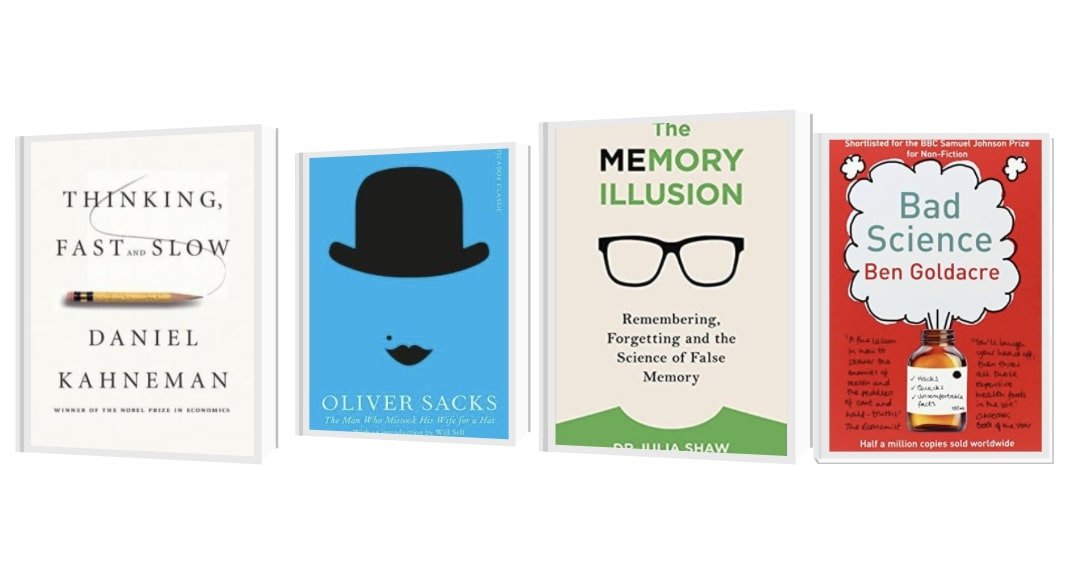
Also try to read some scientific papers and start thinking critically about them, and stay updated on developments in psychology and psychology in the news. E.g. Through reading The New Scientist - Psychology News , Neuroscience News , Naked Scientist Psychology articles & podcasts, or the Royal Society of Psychology research articles, podcasts and blog posts.
(2) Emphasise your academic abilities and how these will ensure you suit the Psychology course.
Throughout your personal statement, you should demonstrate how you have built skills in preparation for university and for studying Psychology .
To begin preparation, brainstorm your academic abilities and skills, and how these ensure you will suit the course/s you are applying for. Extensively research your top university choices, and see if they have a page dedicated to what they want from applicants. Fill a table as in the example below to help you relate your skills to the study of Psychology.
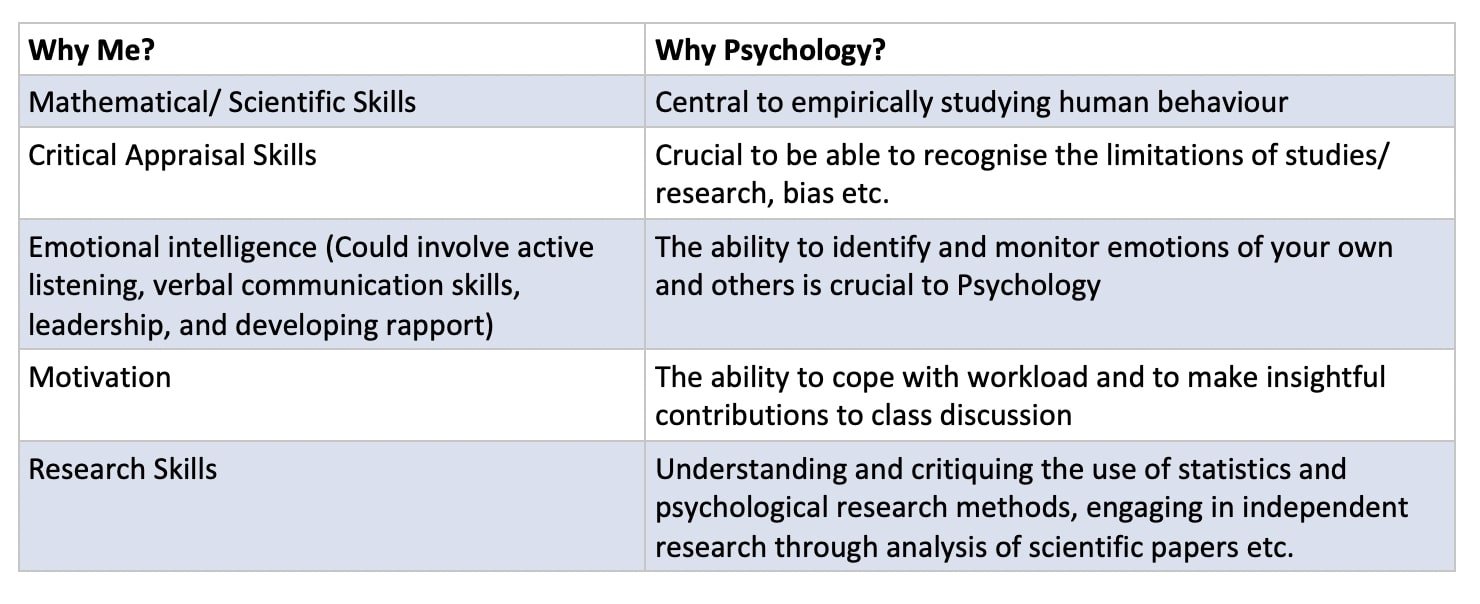
(3) Discuss extra-curricular activities and how these relate to your subject interests
Many students mistake “extra-curricular activities” for non-subject-related activities such as sport, art, or music. Whilst you can mention these at the end of your personal statement, you are much better off mentioning co-curriculars that directly link to your subject, especially if applying to Oxford or Cambridge (non-academic activities should be 2-3 lines maximum to round-off your personal statement in this case).
If you can’t think of co-curricular activities to mention, now is the time to start finding opportunities to take part in! Here are some ideas:
Psychology Essay Competitions
Minds Underground hosts a Psychology Essay Competition each year. This year, the competition includes a Psychology Research Proposal Challenge, which is perfect for demonstrating independent research & initiative, and will encourage you to learn about experimental design, data collection, handling and analysis.
Also check out Oxford and Cambridge-run essay competitions e.g. Newnham College runs a Psychological & Behavioural Sciences competition each year.
Research Projects
You could task yourself with curating your own independent research project to mention on your personal statement.
3 Example Human Psychology Projects:
Investigating the effects of colour, word type, or other non-semantic factors on memory/reaction time/false memory recall of word lists
Influence of age/gender/multilingualism or any number of other factors on memory, number & word processing, any easily quantifiable metric.
An investigation into behavioural economics in the style of Kahneman & Tversky, looking at Type 1 & 2 decision making and how this can be influenced, for example, by advertising and product placement.
If you are looking to undertake a project under the tutelage of a Psychology subject expert, we also run specialised guided research projects through Minds Underground, usually a month in duration, with weekly project tutorial sessions (these are paid). E.g. “A Psychology or Medicine Project with a Research Associate for the Nuffield Department of Clinical Neurosciences at the Oxford University Hospital Trust (NHS)” or “Psychiatrists & Pharmaceuticals: Alzheimer’s Research Project” with Psychology & Philosophy Oxford graduate, Georgia, who is studying for an MSc in Child and Adolescent Mental Health at UCL.
The aim is to combine teaching of high-level subject-specific content with exposure to real-world applications of these concepts, giving you the opportunity to undertake a project that is both useful for a university application and potential future career.
The projects are great to mention on personal statements, and make impressive talking points at your interview, particularly for top UK universities such as Oxbridge (our project hosts are all Oxbridge-educated), who favour applicants with an interest in scientific research.
Societies, Summer Schools & Lectures/ Talks
Are you part of your school’s Psychology Society ? If the school doesn’t have one, could you start one up? Or if they have a STEM society, could you introduce a Psychology element or invite speakers for lectures?
We host a fantastic Psychology Summer School for university applicants, hosted by our team of Psychology Oxbridge graduates. The weekly sessions, running from July to September, will provide a taster of University level Psychology, to provide material which students can write about in personal statements, an discuss during their interviews
There are a plethora of online lectures and talks for you to access online - E.g. Gresham College Psychology lectures, or Ted Talks on Psychology
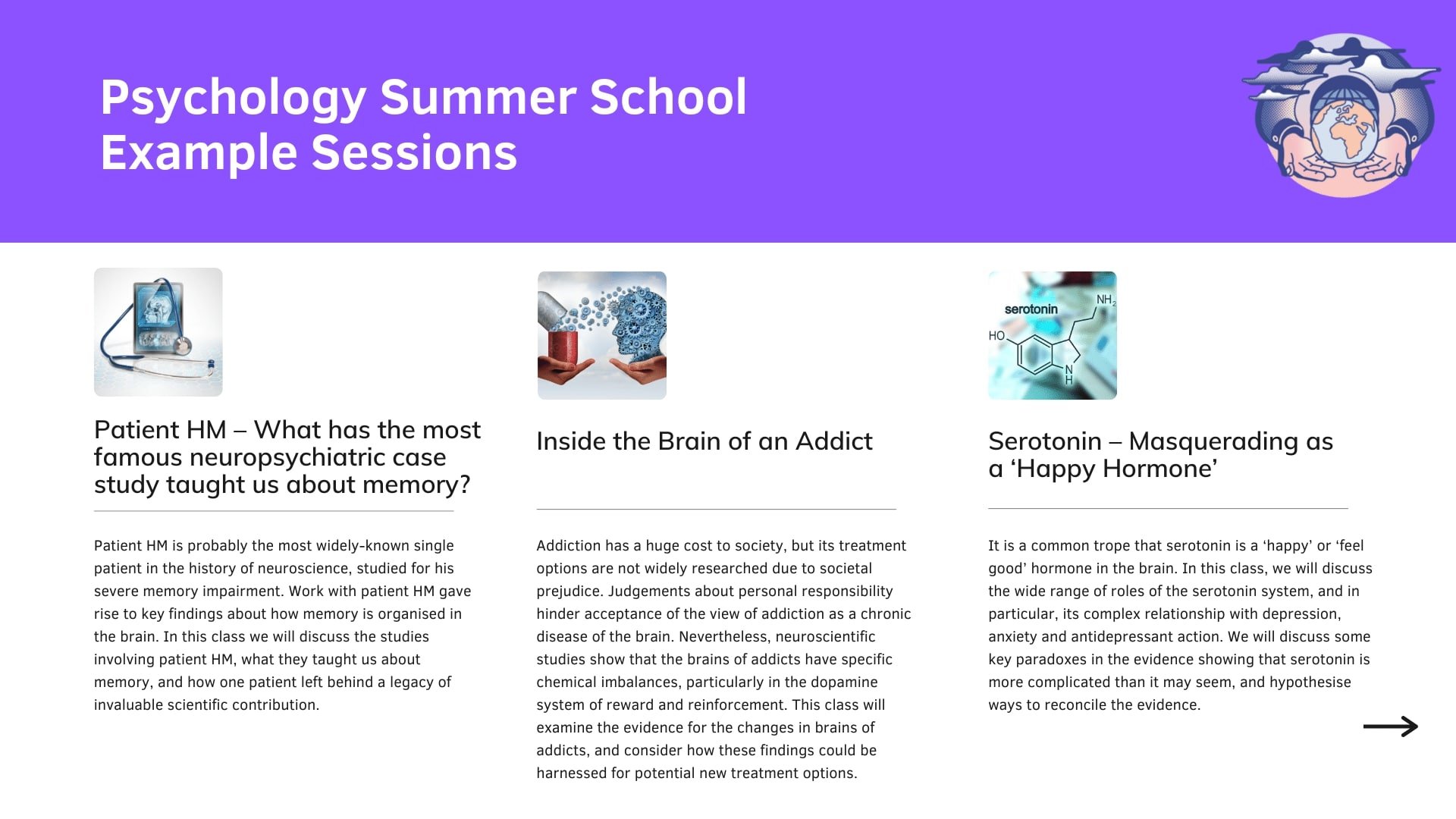
Additional Psychology Personal Statement Advice for those applying to Oxbridge: Oxford, Cambridge
Applying to leading courses like Cambridge's Psychological and Behavioural Sciences or Oxford's Experimental Psychology course requires a tailored approach in your personal statement. Here's how you can make your statement stand out for these Oxbridge courses, compared to non-Oxbridge programmes:
Research-Centric Focus:
Highlight your interest in research from the very beginning. Discuss specific research projects you've been involved in or research findings that have fascinated you.
Look into the cutting-edge research conducted at Cambridge or Oxford and see if anything aligns with your academic interests.
Interdisciplinary Connections:
Emphasise your readiness to explore the interdisciplinary aspects of psychology. These Oxbridge courses often connect psychology with other fields. Mention your interest in related subjects such as neuroscience, biology, or even philosophy, if relevant.
Discuss how these interdisciplinary connections will enrich your understanding of psychology and your research capabilities.
Critical Thinking and Independent Study:
Both Cambridge and Oxford value independent learning and critical thinking. Share your experiences with independent research, coursework, or self-study that demonstrate your ability to think critically and engage deeply with psychology.
Specific Course Features:
Relate some of your content to the unique features of the course at either Cambridge or Oxford. For example, Cambridge's Psychological and Behavioural Sciences course includes a multidisciplinary approach to understanding human behaviour. Oxford's Experimental Psychology course focuses on research design and data analysis.
Explain how these aspects align with your academic goals and career aspirations.
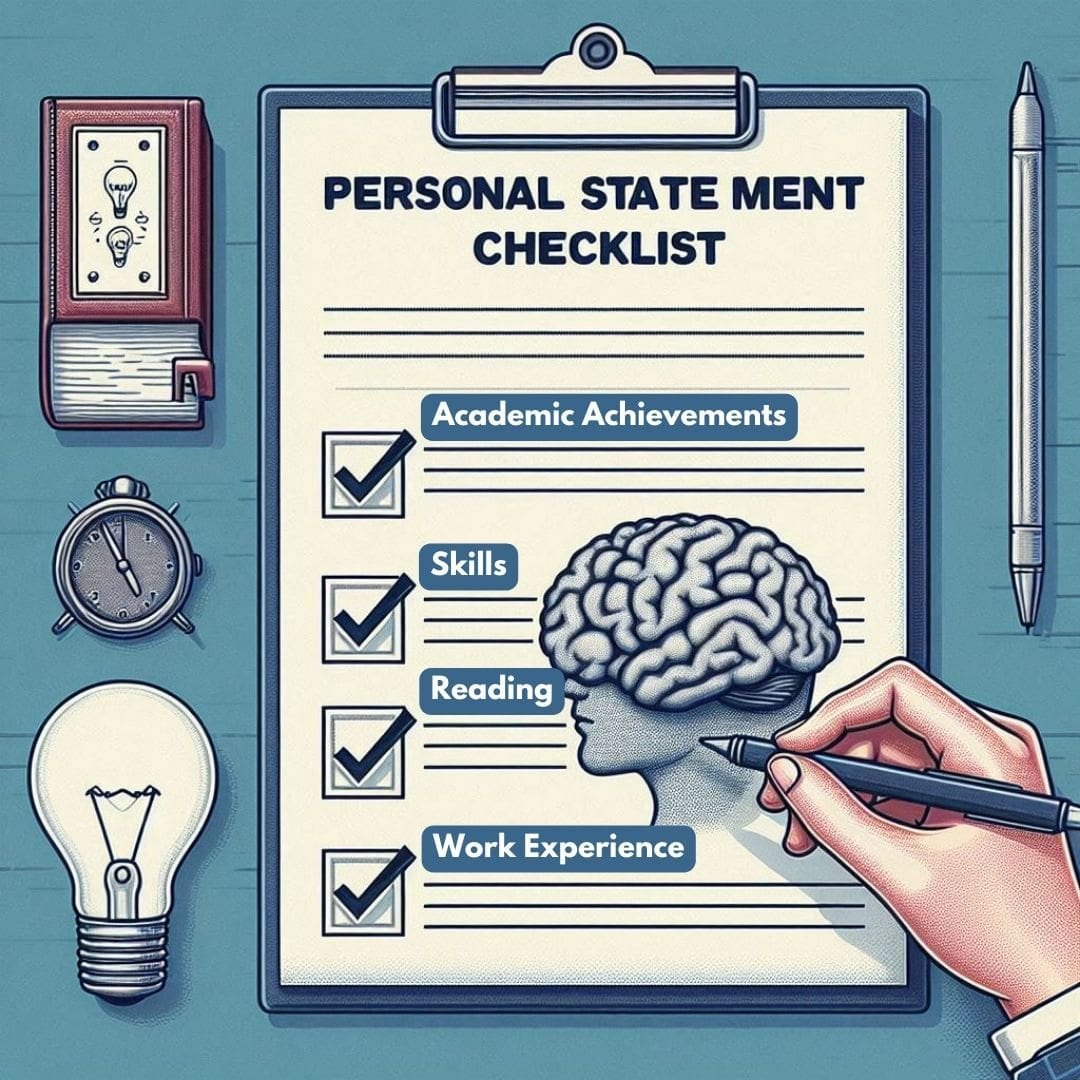
Use of Research Methods:
Try to demonstrate your familiarity with research methods and data analysis tools, as these are central to both courses. Highlight any coursework or projects that have developed your skills in these areas.
Looking Beyond the Classroom:
Mention your involvement in psychology-related co-curricular activities, such as higher level topic areas, clubs, volunteer work, or internships, to demonstrate your dedication to the field beyond academic requirements.
You could seek guidance from your teachers or one of U2’s Oxbridge Psychology tutors, who are familiar with the specific requirements and expectations of Oxbridge courses. They can provide invaluable insights and help you refine your personal statement. Contact us if you’d like to learn more.
Next Steps: Drafting & Structuring Your Psychology Personal Statement
Try to narrow your interests down to 2 or 3 topic areas which you can use as overarching themes for your personal statement, e.g. (1) Theories of Mind, of Consciousness, (2) Psychology & Gender, (3) Social Psychology - Group Identity.
Ensure you can address these themes in depth. Have a range of resources to draw from e.g. a scientific paper, a book, research you undertook as part of an essay competition.
Ensure a strong narrative , including linking of concepts between key sections.
Demonstrate personal critical analysis to show your engagement and interest in the subject.
Example Psychology Personal Statement Structure
Aim for around four main paragraphs:
1st paragraph (introductory): What is your motivation to study Psychology? Be specific: what do you want to explore at university? What is distinctive about studying Psychology that makes it worthwhile? Ensure you talk about what motivates your study of the subject now, not a catalyst from your childhood as the interviewer will find it clichéd and less relevant.
2nd paragraph: Explore your interest in [Insert topic] through [Insert activity: e.g. Summer School]. Which of your abilities did this highlight? Link the topic to an interest in [Insert research form: An experiment, article etc.]. Link this to [Insert another activity e.g. a Cambridge lecture on X].
3rd paragraph: Link to paragraph two. This paragraph can follow the same format, but deal with a different topic/ theme.
4th paragraph: Mention extra-curricular activities that don’t relate to your subject interests really briefly (e.g., music, volunteering, anything else of relevance) and demonstrate how these have built skills in preparation for university and for studying Psychology.
You could mention your other A-Level/ IB subjects, perhaps describing how they have enhanced your study of Psychology.
You could mention any prizes or roles of responsibility which you have had at school, including any clubs that you might organise, such as the school newspaper or student council.
It can be useful to conclude your personal statement by returning to your aptitude for studying the subject in a final few lines . Which core skills do you possess which will equip you to excel at degree level? It’s important to strike a balance between enthusiasm for the subject and evidence of skills.
Example Successful Psychology Personal Statement
Looking at personal statement examples can help you to understand how to structure your own statement and what to include. Below, we have included an example of a successful Cambridge Psychology personal statement, written by one of our 1st Class Cambridge PBS tutors. N.B. The statement is by no means perfect, but should provide an exemplar for how to weave your academic interests and co-curricular endeavours into your statement.
Over 100 trillion synapses connect to form neural networks in the brain – an engine so close to home yet more enigmatic than some of the cosmos. How can the very matter we use to think and learn unlock mysteries of the universe, yet not know exactly how it stores memories? It is these existential questions that fuel my fascination for studying the delicate mechanisms of our minds. Year one of my A-levels, what started as curiosity became increasingly interesting to me. Psychology lessons were deeply thought-provoking, particularly when biological and cognitive psychology were the topics of study. The biology behind the metaphysics of consciousness and perception has since captured me, especially when considering neurological disorders. Fascinated by these phenomena, last year I attended a lecture by Baland Jalal; he discussed his own research into a cure for sleep paralysis, as well as demonstrating his enthusiasm for the field which was a perfect cross-section of various disciplines that I love. To further explore this new intricate field of interest, I read “The New Science of Consciousness” by Paul Nunez; this book offered me a profound insight into the philosophy and “hard problems” that this science faces; whilst explanations for Alzheimer’s and Free Will are difficult to retrieve, the questions we need to ask are even harder to formulate. Cures for neurodegenerative diseases are currently beyond our grasp, which I believe will be changed with further years of research that I would be honoured to be a part of. The challenges and speculations associated with understanding the brain and our behaviour draws me into the subject as I enjoy combining abstract and logical thinking to decipher problems. Both studying logical programming in Computer Science and my EPQ (an investigation into creating a handmade Wilson Cloud Chamber) showcase the interface of these types of thinking. Self-teaching has been a critical aspect of advancing my knowledge of Neuropsychology as at A-Level there is no depth into more peculiar cases (many of which I discovered after reading “The Man Who Mistook His Wife For a Hat” by Oliver Sacks) such as Anton-Babinski Syndrome – a rare symptom of brain damage that causes people to be “cortically blind”, yet inexplicably deny their blindness. Using my own learning techniques, in Year 12 I helped tutor students in Year 7 physics classes. The significant change in learning style developed my methods of tutoring, teaching me to work with and teach peers of varying ages and enhance my ability to describe difficult concepts in an appropriate and understandable way. During year 12 I was accepted onto the Sutton Trust US Programme – a competitive Fulbright programme for high-achieving state-school students. I was one of 150 students picked from 1000+ applicants. Learning to deal with additional, international examinations and workload alongside school, being the guitarist in a band, and rock-climbing has been essential for my personal development, allowing me to handle substantial pressure. I was awarded a visit to Massachusetts Institute of Technology’s graduate laboratories where I saw leading research into many disciplines of science. This year however I decided that the more specialised curriculum offered in the UK was better suited for me – nevertheless, I am still an alum and volunteer for the programme and was chosen to be an advisor at USA college day this year. I gave individual advice to hundreds of young people, ensuring they had information and advice they needed to pursue undergraduate studies ideal for them. As a member of my school’s Student Wellbeing team, it is evident to anyone that a distinct and recurring interest of mine is to help people. I believe this perfectly ties into my desire to research the brain, as I am driven to be part of the research that will prevent neurodegeneration, aid mental illness and answer the fundamental questions that make us human. As written by Paul Nunez, “The phenomenon of consciousness is the major unsolved challenge of our age”.
Finally, remember not to start thinking about your personal statement too late! The content building part is by far the most important - without well-thought out content and a wide range of evidence for your independent exploration, you will not be able to write an engaging personal statement. The writing part will be easy if you have lots of exciting content to draw from.
Best of luck!
Looking for a Personal Statement Tutor or Support For Your Wider Psychology Application?
Psychology personal statement tutoring.
U2’s Oxbridge-educated mentors have a close insight into what admissions tutors like to see in a Psychology personal statement, and can help students to convey their skills, motivations, and long term goals, in order to stand out from other applicants. The statement should be the candidate’s own work, but our mentors will provide direction and guide you through the process of content building and writing. We offer offline drafting as well as tuition sessions.
Oxbridge Psychology Tutoring
We have a large team of Oxbridge-educated Psychology mentors including 1st Class, Master’s and PhD level graduates, who support students throughout the process, including personal statement, admissions test and interview preparation.
The Process:
1) We suggest an Oxbridge Psychology graduate as a mentor and send their full CV for review. Our mentors are deeply familiar with the admissions process to study Psychology at the University of Oxford and Cambridge, and are well-placed to guide you through personal statement curation and the interview process. We may suggest a range of application tutors to choose from with slightly differing rates depending on qualifications and level of experience.
2) We typically suggest beginning with a 1.5 hour diagnostic session , where the mentor will informally assess the student’s current performance level for application. Following this, we issue a report with feedback, and structure a plan to best prepare.
3) U2’s approach for regular Psychology application sessions: The main focus of tutorial sessions will be to explore material that can be discussed in the personal statement and at interview - this may sometimes stretch from A-Level standard to First Year Undergraduate.
Mentors ensure each student refines their interests within Psychology, and is exposed to a range of key themes and topics.
Throughout there will be a focus on the experimental side of psychology, by centering the course on real studies, and discussing the techniques and limitations involved in psychological experiments. Together, we build a case for the student, solidifying the stance and direction they will take during the interview.
Frequency of sessions can be decided between student and mentor. Students can take either ad hoc sessions, or we structure a full programme for preparation, which may include further co-curricular opportunities such as our research projects , Psychology summer school and Oxbridge mock interview days .
Honing the skills necessary to succeed for Oxbridge ideally requires long-term preparation and mentoring presents a wonderful opportunity to learn from some of the very best Oxbridge has produced.
Sessions from £75/h + VAT.
Related Blogs and Resources
How to Prepare for Your Oxbridge Interview
University Entry, Application & Admissions Tutoring
Oxbridge Psychology Interview Preparation Guide
How To Get a 9 In English GCSE: Our Oxbridge-Educated GCSE English Tutors’ Top Tips for 2024
Applying for french at university in 2024 what to read and watch for your personal statement and oxbridge interviews.
Have a language expert improve your writing
Run a free plagiarism check in 10 minutes, generate accurate citations for free.
- Knowledge Base
- Applying to graduate school
- How to Write Your Personal Statement | Strategies & Examples
How to Write Your Personal Statement | Strategies & Examples
Published on February 12, 2019 by Shona McCombes . Revised on July 3, 2023.
A personal statement is a short essay of around 500–1,000 words, in which you tell a compelling story about who you are, what drives you, and why you’re applying.
To write a successful personal statement for a graduate school application , don’t just summarize your experience; instead, craft a focused narrative in your own voice. Aim to demonstrate three things:
- Your personality: what are your interests, values, and motivations?
- Your talents: what can you bring to the program?
- Your goals: what do you hope the program will do for you?
This article guides you through some winning strategies to build a strong, well-structured personal statement for a master’s or PhD application. You can download the full examples below.
Urban Planning Psychology History
Table of contents
Getting started with your personal statement, the introduction: start with an attention-grabbing opening, the main body: craft your narrative, the conclusion: look ahead, revising, editing, and proofreading your personal statement, frequently asked questions, other interesting articles.
Before you start writing, the first step is to understand exactly what’s expected of you. If the application gives you a question or prompt for your personal statement, the most important thing is to respond to it directly.
For example, you might be asked to focus on the development of your personal identity; challenges you have faced in your life; or your career motivations. This will shape your focus and emphasis—but you still need to find your own unique approach to answering it.
There’s no universal template for a personal statement; it’s your chance to be creative and let your own voice shine through. But there are strategies you can use to build a compelling, well-structured story.
The first paragraph of your personal statement should set the tone and lead smoothly into the story you want to tell.
Strategy 1: Open with a concrete scene
An effective way to catch the reader’s attention is to set up a scene that illustrates something about your character and interests. If you’re stuck, try thinking about:
- A personal experience that changed your perspective
- A story from your family’s history
- A memorable teacher or learning experience
- An unusual or unexpected encounter
To write an effective scene, try to go beyond straightforward description; start with an intriguing sentence that pulls the reader in, and give concrete details to create a convincing atmosphere.
Strategy 2: Open with your motivations
To emphasize your enthusiasm and commitment, you can start by explaining your interest in the subject you want to study or the career path you want to follow.
Just stating that it interests you isn’t enough: first, you need to figure out why you’re interested in this field:
- Is it a longstanding passion or a recent discovery?
- Does it come naturally or have you had to work hard at it?
- How does it fit into the rest of your life?
- What do you think it contributes to society?
Tips for the introduction
- Don’t start on a cliche: avoid phrases like “Ever since I was a child…” or “For as long as I can remember…”
- Do save the introduction for last. If you’re struggling to come up with a strong opening, leave it aside, and note down any interesting ideas that occur to you as you write the rest of the personal statement.
Once you’ve set up the main themes of your personal statement, you’ll delve into more detail about your experiences and motivations.
To structure the body of your personal statement, there are various strategies you can use.
Strategy 1: Describe your development over time
One of the simplest strategies is to give a chronological overview of key experiences that have led you to apply for graduate school.
- What first sparked your interest in the field?
- Which classes, assignments, classmates, internships, or other activities helped you develop your knowledge and skills?
- Where do you want to go next? How does this program fit into your future plans?
Don’t try to include absolutely everything you’ve done—pick out highlights that are relevant to your application. Aim to craft a compelling narrative that shows how you’ve changed and actively developed yourself.
My interest in psychology was first sparked early in my high school career. Though somewhat scientifically inclined, I found that what interested me most was not the equations we learned about in physics and chemistry, but the motivations and perceptions of my fellow students, and the subtle social dynamics that I observed inside and outside the classroom. I wanted to learn how our identities, beliefs, and behaviours are shaped through our interactions with others, so I decided to major in Social Psychology. My undergraduate studies deepened my understanding of, and fascination with, the interplay between an individual mind and its social context.During my studies, I acquired a solid foundation of knowledge about concepts like social influence and group dynamics, but I also took classes on various topics not strictly related to my major. I was particularly interested in how other fields intersect with psychology—the classes I took on media studies, biology, and literature all enhanced my understanding of psychological concepts by providing different lenses through which to look at the issues involved.
Strategy 2: Own your challenges and obstacles
If your path to graduate school hasn’t been easy or straightforward, you can turn this into a strength, and structure your personal statement as a story of overcoming obstacles.
- Is your social, cultural or economic background underrepresented in the field? Show how your experiences will contribute a unique perspective.
- Do you have gaps in your resume or lower-than-ideal grades? Explain the challenges you faced and how you dealt with them.
Don’t focus too heavily on negatives, but use them to highlight your positive qualities. Resilience, resourcefulness and perseverance make you a promising graduate school candidate.
Growing up working class, urban decay becomes depressingly familiar. The sight of a row of abandoned houses does not surprise me, but it continues to bother me. Since high school, I have been determined to pursue a career in urban planning. While people of my background experience the consequences of urban planning decisions first-hand, we are underrepresented in the field itself. Ironically, given my motivation, my economic background has made my studies challenging. I was fortunate enough to be awarded a scholarship for my undergraduate studies, but after graduation I took jobs in unrelated fields to help support my parents. In the three years since, I have not lost my ambition. Now I am keen to resume my studies, and I believe I can bring an invaluable perspective to the table: that of the people most impacted by the decisions of urban planners.
Strategy 3: Demonstrate your knowledge of the field
Especially if you’re applying for a PhD or another research-focused program, it’s a good idea to show your familiarity with the subject and the department. Your personal statement can focus on the area you want to specialize in and reflect on why it matters to you.
- Reflect on the topics or themes that you’ve focused on in your studies. What draws you to them?
- Discuss any academic achievements, influential teachers, or other highlights of your education.
- Talk about the questions you’d like to explore in your research and why you think they’re important.
The personal statement isn’t a research proposal , so don’t go overboard on detail—but it’s a great opportunity to show your enthusiasm for the field and your capacity for original thinking.
In applying for this research program, my intention is to build on the multidisciplinary approach I have taken in my studies so far, combining knowledge from disparate fields of study to better understand psychological concepts and issues. The Media Psychology program stands out to me as the perfect environment for this kind of research, given its researchers’ openness to collaboration across diverse fields. I am impressed by the department’s innovative interdisciplinary projects that focus on the shifting landscape of media and technology, and I hope that my own work can follow a similarly trailblazing approach. More specifically, I want to develop my understanding of the intersection of psychology and media studies, and explore how media psychology theories and methods might be applied to neurodivergent minds. I am interested not only in media psychology but also in psychological disorders, and how the two interact. This is something I touched on during my undergraduate studies and that I’m excited to delve into further.
Strategy 4: Discuss your professional ambitions
Especially if you’re applying for a more professionally-oriented program (such as an MBA), it’s a good idea to focus on concrete goals and how the program will help you achieve them.
- If your career is just getting started, show how your character is suited to the field, and explain how graduate school will help you develop your talents.
- If you have already worked in the profession, show what you’ve achieved so far, and explain how the program will allow you to take the next step.
- If you are planning a career change, explain what has driven this decision and how your existing experience will help you succeed.
Don’t just state the position you want to achieve. You should demonstrate that you’ve put plenty of thought into your career plans and show why you’re well-suited to this profession.
One thing that fascinated me about the field during my undergraduate studies was the sheer number of different elements whose interactions constitute a person’s experience of an urban environment. Any number of factors could transform the scene I described at the beginning: What if there were no bus route? Better community outreach in the neighborhood? Worse law enforcement? More or fewer jobs available in the area? Some of these factors are out of the hands of an urban planner, but without taking them all into consideration, the planner has an incomplete picture of their task. Through further study I hope to develop my understanding of how these disparate elements combine and interact to create the urban environment. I am interested in the social, psychological and political effects our surroundings have on our lives. My studies will allow me to work on projects directly affecting the kinds of working-class urban communities I know well. I believe I can bring my own experiences, as well as my education, to bear upon the problem of improving infrastructure and quality of life in these communities.
Tips for the main body
- Don’t rehash your resume by trying to summarize everything you’ve done so far; the personal statement isn’t about listing your academic or professional experience, but about reflecting, evaluating, and relating it to broader themes.
- Do make your statements into stories: Instead of saying you’re hard-working and self-motivated, write about your internship where you took the initiative to start a new project. Instead of saying you’ve always loved reading, reflect on a novel or poem that changed your perspective.
Your conclusion should bring the focus back to the program and what you hope to get out of it, whether that’s developing practical skills, exploring intellectual questions, or both.
Emphasize the fit with your specific interests, showing why this program would be the best way to achieve your aims.
Strategy 1: What do you want to know?
If you’re applying for a more academic or research-focused program, end on a note of curiosity: what do you hope to learn, and why do you think this is the best place to learn it?
If there are specific classes or faculty members that you’re excited to learn from, this is the place to express your enthusiasm.
Strategy 2: What do you want to do?
If you’re applying for a program that focuses more on professional training, your conclusion can look to your career aspirations: what role do you want to play in society, and why is this program the best choice to help you get there?
Tips for the conclusion
- Don’t summarize what you’ve already said. You have limited space in a personal statement, so use it wisely!
- Do think bigger than yourself: try to express how your individual aspirations relate to your local community, your academic field, or society more broadly. It’s not just about what you’ll get out of graduate school, but about what you’ll be able to give back.
You’ll be expected to do a lot of writing in graduate school, so make a good first impression: leave yourself plenty of time to revise and polish the text.
Your style doesn’t have to be as formal as other kinds of academic writing, but it should be clear, direct and coherent. Make sure that each paragraph flows smoothly from the last, using topic sentences and transitions to create clear connections between each part.
Don’t be afraid to rewrite and restructure as much as necessary. Since you have a lot of freedom in the structure of a personal statement, you can experiment and move information around to see what works best.
Finally, it’s essential to carefully proofread your personal statement and fix any language errors. Before you submit your application, consider investing in professional personal statement editing . For $150, you have the peace of mind that your personal statement is grammatically correct, strong in term of your arguments, and free of awkward mistakes.
A statement of purpose is usually more formal, focusing on your academic or professional goals. It shouldn’t include anything that isn’t directly relevant to the application.
A personal statement can often be more creative. It might tell a story that isn’t directly related to the application, but that shows something about your personality, values, and motivations.
However, both types of document have the same overall goal: to demonstrate your potential as a graduate student and s how why you’re a great match for the program.
The typical length of a personal statement for graduate school applications is between 500 and 1,000 words.
Different programs have different requirements, so always check if there’s a minimum or maximum length and stick to the guidelines. If there is no recommended word count, aim for no more than 1-2 pages.
If you’re applying to multiple graduate school programs, you should tailor your personal statement to each application.
Some applications provide a prompt or question. In this case, you might have to write a new personal statement from scratch: the most important task is to respond to what you have been asked.
If there’s no prompt or guidelines, you can re-use the same idea for your personal statement – but change the details wherever relevant, making sure to emphasize why you’re applying to this specific program.
If the application also includes other essays, such as a statement of purpose , you might have to revise your personal statement to avoid repeating the same information.
If you want to know more about college essays , academic writing , and AI tools , make sure to check out some of our other language articles with explanations, examples, and quizzes.
College essays
- College essay examples
- College essay format
- College essay style
- College essay length
- Diversity essays
- Scholarship essays
Academic writing
- Writing process
- Avoiding repetition
- Literature review
- Conceptual framework
- Dissertation outline
- Thesis acknowledgements
- Burned or burnt
- Canceled or cancelled
- Dreamt or dreamed
- Gray or grey
- Theater vs theatre
Cite this Scribbr article
If you want to cite this source, you can copy and paste the citation or click the “Cite this Scribbr article” button to automatically add the citation to our free Citation Generator.
McCombes, S. (2023, July 03). How to Write Your Personal Statement | Strategies & Examples. Scribbr. Retrieved June 7, 2024, from https://www.scribbr.com/graduate-school/personal-statement/
Is this article helpful?
Shona McCombes
Other students also liked, how to write a graduate school resume | template & example, how (and who) to ask for a letter of recommendation, master's vs phd | a complete guide to the differences, get unlimited documents corrected.
✔ Free APA citation check included ✔ Unlimited document corrections ✔ Specialized in correcting academic texts
- Log in
- Site search
Psychology personal statement
Postgraduate Diplomas (PGDip) and Masters courses in psychology are one of the most popular conversion courses available. Take a look at our personal statement example to help with your application
A personal statement for a psychology conversion course isn't significantly different from an application for any other subject. You'll still be expected to discuss your reasons for choosing the course and particular institution, as well as your relevant skills and experience along with your career goals.
In addition, you will also need to cover:
- your motivation to change subjects/careers, with evidence to back up your decision
- any preparation you have done to help you study psychology at postgraduate level. This might include relevant aspects of your current undergraduate degree, independent reading or other ways you have engaged with the subject.
If you are thinking of pursuing a career in a psychological profession, relevant volunteer or work experience is valuable evidence to back up your decision to move into psychology. Rather than describing your experience, reflect on how it has shaped your motivation and what you have learned about your chosen profession.
This example should be used for guidance only. Copying any of this text could significantly harm your chances of securing a place on a course.
Psychology personal statement example
Working as a listening volunteer with Nightline throughout my degree in politics and international relations prompted me to embark on a career that helps others. Here, I gained an insight into mental health conditions and saw the impact that empathetic listening and an opportunity to talk can have on those experiencing them. The training I received was my first insight into psychology, introducing me to concepts that inform our approach, such as the development of self-concept and the role of unconditional positive regard in building rapport with callers.
Learning about the theory underpinning my work at Nightline motivated me to develop a deeper understanding of psychological theories and approaches. I have undertaken a range of independent reading that I can build upon in a more structured way through the MSc in Psychology. Reading texts such as How Emotions are Made and The Body Keeps the Score to learn more about the experiences of Nightline callers has given me an insight into the complex interplay of biological and social factors that shape emotions and responses to trauma, while introducing me to research from biological and social psychology, psychiatry and neuroscience.
I am now working as a support worker in a community mental health team where I have observed the different applications of psychological approaches by clinical psychologists, therapists and counsellors. I have recently been able to sit in on meetings between clients and a clinical psychologist and observe the different approaches to assessing client's conditions as well as witness the ways the psychologist worked in partnership with clients to develop and monitor a tailored combination of practical and therapeutic support. The focus on taking evidence-informed approaches and evaluating the effectiveness of interventions motivated me to apply for the Masters in psychology to develop an in-depth understanding of the research that underpins psychological perspectives and theoretical approaches.
I chose the course at XX University due to the optional modules focused on mental health. I am excited by the applied focus of these modules and the opportunity to learn from the research practitioners teaching on the course. I have a particular interest in mental health stigma and holistic approaches to mental health management that I look forward to exploring in more depth with a view to completing my dissertation in this area.
My undergraduate degree has prepared me to engage with the scientific approaches used in psychology. Modules on social science research methods and an introduction to statistics have provided me with a good grounding on qualitative and quantitative research design that I can build upon during the MSc course. I applied my learning from the introduction to statistics module in my dissertation where I conducted statistical modelling using previous voting patterns to assess the potential impact of proposed constituency changes on future local and general elections. Throughout my degree I organised my time effectively to complete coursework, presentations and group tasks alongside my volunteer role and part-time work, consistently achieving a 2:1 in my work.
I intend to continue my support worker role part-time alongside the Masters in psychology to apply my learning and build further experience to support my application for an assistant psychologist post on graduation. The Masters in psychology is an exciting step towards my goal of becoming a clinical psychologist and, in combination with my work experience will support me in pursuing the Doctorate in clinical psychology in the longer term.
Find out more
- Search for a psychology Masters .
- Discover what psychology conversion courses involve.
- Learn more about personal statements for postgraduate applications .
- Find out more about applying for a Masters .
How would you rate this page?
On a scale where 1 is dislike and 5 is like
- Dislike 1 unhappy-very
- Like 5 happy-very
Thank you for rating the page
Clearing Universities & Courses
Clearing advice.
Recommended Clearing Universities
Popular Course Categories

Course Search & Discover
Start the search for your uni. Filter from hundreds of universities based on your preferences.
Search by Type
Search by region.
Recommended Universities

University of Surrey
South East England · 98% Recommended

Swansea University
Wales · 100% Recommended

Northeastern University - London
London (Greater) · 100% Recommended
Search Open Days
What's new at Uni Compare

Bangor University
Find the perfect Criminology degree which allows you to specialise in your interests

University of Brighton
Explore Criminology degrees and pursue careers in law enforcement or criminal justice
Ranking Categories
Regional rankings.
More Rankings

Top 100 Universities
Taken from 65,000+ data points from students attending university to help future generations

About our Rankings
Discover university rankings devised from data collected from current students.
Guide Categories
Advice categories, recommended articles, popular statement examples, not sure what to search for, take our quick degree quiz.
Find the ideal uni course for you with our Course Degree Quiz. Get answers in minutes!
Take our full degree quiz
Get more tailored course suggestions with our full Course Degree Quiz and apply with confidence.

PERSONAL STATEMENT EXAMPLE Psychotherapy and Counselling: Practices and Principles Personal Statement
Submitted by Chloe

Calling all curious minds! Delve into the depths of human behaviour at Swansea.
Get expert scientific training and unlock the secrets of the mind with Swansea's Psychology degrees. Explore their wide range of degrees and discover how you can tailor your studies to your interests.

Study Psychology at a BPS accredited Uni
Discover the wide world of Psychology, from human development to influences like biology and socialisation at Bangor.
Psychotherapy and Counselling: Practices and Principles Personal Statement
I have always desired to understand feelings, behaviour and the human mind; always been driven toward solving the questions that start with why. However, after leading many spontaneous counselling sessions with friends, witnessing the empowering feeling it brings to simply aid someone find a way forward, instead, I also became driven toward solving the questions that start with how. I would deem it a privilege to take the time with someone to answer how they can move forward from their situation and how they can deal with whatever hand life has dealt them, as well as being able to diagnose any conditions before initiating treatment. All of these feelings have led me to aspire toward the rewarding career path of becoming a therapist or counsellor and I believe this degree would lay down the foundations I would need for this to happen. Following on from this, I would strive towards a Master’s degree in Integrative Counselling and Psychotherapy to get closer to my chosen career and enhance my undergraduate skills.
Upon volunteering with Scropton Riding for the Disabled Centre, I was able to witness the psychological impacts living with disabilities had, such as the extra sense of fear implemented in everything both the children and parents did. But on the other hand, I saw the psychological benefits the horsemanship brought to the children, even just for a small time, as they were able to express their enjoyment for an activity the same as an able-bodied child simply through laughter and smiling. As well as this, I have also participated in shadowing a health visitor, in this I saw new mothers suffering from postnatal depression but also struggling to understand the normality of this condition. From studying sociology I learnt society places many stigmas upon psychological conditions such as postnatal depression through a lack of understanding about it; I was able to apply this knowledge and analysis when observing how the mothers suffering deemed themselves as inadequate. All of this experience inspired me further toward working to help people overcome psychological conditions which inhibit their way of life and relationships with those around them. I have recently begun learning about “Straightness training” with my own horse; this is used to enhance an understanding of the psychology behind why horses act a certain way and help to find solutions. This has enabled me to witness an alternative approach to interpreting behaviour, but in a way in which the participant is not able to communicate or explain through speech. Because of this, I have been able to further develop skills in observing feelings and emotions, which I feel would greatly benefit me when doing so with humans in counselling practice.
I have studied sociology at both GCSE and A-level and from this, I have learnt invaluable skills in analysis of society as a whole, however, this has only motivated me more to learn about the individuals that make up this society. I feel studying about psychology or psychotherapy would allow me to do this through understanding not only different conditions but also the motives behind people’s actions. I have also developed the skill of being able to use studies made by sociologists in my essay writing. My essay writing skills and structuring have also developed through A-Level English Literature, as well as my analysis skills developed further through A-Level history.
I feel I would be most suitable for this course as I am able to display compassion and sympathy but also critical thinking toward a subject I am greatly passionate about. Many people wonder why someone would choose to work in an environment infiltrated with misery; however, I have reached the realisation that the ever-changing world we live in is indisputable and as opposed to dwelling on the unfortunate events, it is essential that focus is placed upon the recovery. Quite simply, I believe the perfect opportunity to make any positive change is only granted through being surrounded by what was once misery.
Recommended Course

Recommended Statements
Submitted by anonymous
Psychology and Philosophy Personal Statement
For centuries humanity has pondered the definitions of truth and falsehood. For many, the truth is simply ...
Psychology Personal Statement
While growing up, an individual experiences countless differing fields of psychology without even realisin...
My first experience in the field of psychology was in year 9, I was asked to complete a project of my choo...
My desire for wanting to pursue psychology in higher education not only stems from a personal perspective ...

undergraduate Universities
Undergraduate uni's.

Uni of Surrey
736 courses

Swansea Uni
1324 courses

Northeastern Uni
.jpg)
114 courses

Uni of Roehampton
469 courses

Goldsmiths, UOL
319 courses

723 courses

West London IoT

Escape Studios

Middlesex Uni
656 courses

Uni of Bradford
385 courses

Uni of Chester
629 courses

Uni of Sunderland
328 courses

Cardiff Met Uni
501 courses

Uni of East London
569 courses

Uni for Creative Arts
614 courses

467 courses

Heriot-Watt Uni
334 courses

Uni of Portsmouth
753 courses

Uni of Leicester
435 courses

Uni of Bedfordshire
654 courses

Uni of Westminster
496 courses

Nottingham Trent
911 courses

Uni of Winchester
257 courses

Leeds Beckett Uni
454 courses

Kingston Uni
616 courses

Coventry Uni
729 courses

Staffordshire Uni
472 courses

Uni of Hertfordshire
584 courses

Queen's Uni
634 courses

884 courses

Uni of Brighton
510 courses

Uni of Reading
683 courses

Uni of Kent
583 courses
,-Bristol.jpg)
UWE, Bristol
497 courses

Wrexham Uni
287 courses

Uni of Huddersfield
642 courses

ARU Writtle

Leeds Arts University

709 courses

Uni of Suffolk
216 courses

Uni of Essex
1398 courses

Uni of C.Lancashire
793 courses

Ravensbourne
103 courses

Uni of Hull

Anglia Ruskin Uni
823 courses

Edge Hill Uni

Bath Spa Uni
513 courses
FIND THE IDEAL COURSE FOR YOU
Degree Course Quiz
Find the ideal university course for you in minutes by taking our degree matchmaker quiz today.
Find the latest from Uni Compare

Surrey is ranked 3rd in the south of the UK for highly skilled employment (HESA 2023)

University of Law
Ranked Top 20 amongst English universities in the 2023 National Student Survey!

American Psychological Association

The impact of transgender legislation
Psychological science points to an increased risk of suicide and poor mental health amid a record number of bills aimed at restricting the rights of the LGBTQ+ population
APA policy supporting transgender, gender diverse, nonbinary individuals
Membership in APA

APA Community
A new exclusive destination tailored for APA members

Membership benefits
Unlock the tools, discounts, and services included with your membership

Renew your membership
Keep your benefits and access to leading psychological information
Psychology topics spotlight

Misinformation and disinformation

Resources to navigate trauma

Tips to foster a healthy workplace
Science and practice of psychology

Ethics Code

Continuing Education

Grants, Awards, and Funding

Standards and Guidelines
Networks and communities

Network with peers, enhance your professional development, expand your personal growth, and more

APA Divisions

High school teachers

Undergraduate educators

Graduate students

Early career psychologists

Managing your career
Resources to help you throughout your career in psychology, including finding a job, salary data, finances and money management, mentoring and supervision, and training and professional development

Explore career paths

Psychologist profiles

How did you get that job?

Events and training
Featured jobs
Apa publications and products.

Write with clarity, precision, and inclusion
Children’s books
Monitor on Psychology
Newsletters
Reports and surveys
Continuing education
Merchandise

Real Siblings
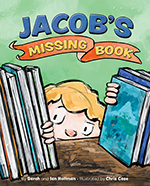
Jacob's Missing Book
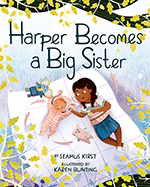
Harper Becomes a Big Sister
Attachment-Based Family Therapy for Sexual and Gender Minority Young Adults and Their Non-Accepting Parents
Dismantling Everyday Discrimination
APA Services

Learn how you can help APA advocate for psychology-informed federal policy and legislation, and support psychological research

APA Services, Inc.
A companion professional organization to APA, serving all members and advocating for psychology
Bandura’s Self-Efficacy Theory Of Motivation In Psychology
Gabriel Lopez-Garrido
Undergraduate at Harvard University
Political Science and Psychology
Gabriel Lopez-Garrido is currently in his final year at Harvard University. He is pursuing a Bachelor's degree with a primary focus on Political Science (Government) and a minor in Psychology.
Learn about our Editorial Process
Saul Mcleod, PhD
Editor-in-Chief for Simply Psychology
BSc (Hons) Psychology, MRes, PhD, University of Manchester
Saul Mcleod, PhD., is a qualified psychology teacher with over 18 years of experience in further and higher education. He has been published in peer-reviewed journals, including the Journal of Clinical Psychology.
On This Page:
Key Takeaways
- Psychologist Albert Bandura has defined self-efficacy as people’s belief in their ability to control their functioning and events that affect their lives.
- One’s sense of self-efficacy can provide the foundation for motivation, well-being, and personal accomplishment.
- People’s beliefs in their efficacy are developed by four primary sources of influence, including (i) mastery experiences, (ii) vicarious experiences, (iii) social persuasion, and (iv) emotional states.
- High self-efficacy has numerous benefits to daily life, such as resilience to adversity and stress, healthy lifestyle habits, improved employee performance, and educational achievement.

The term ‘self-efficacy” was first coined by psychologist Albert Bandura (1977), a Canadian-American psychologist and a professor at Stanford University.
He originally proposed the concept, in his own words, as a personal judgment of “how well one can execute courses of action required to deal with prospective situations”.
Self-Efficacy is a person’s particular set of beliefs that determine how well one can execute a plan of action in prospective situations (Bandura, 1977). To put it in more simple terms, self-efficacy is a person’s belief in their ability to succeed in a particular situation.
Bandura was responsible for bringing the term to light, but psychologists have studied self-efficacy from several perspectives.
To give an example of another perspective, Kathy Kolbe – educator and best-selling author – thinks that believing in one’s own abilities can be vital in measuring cognitive strength (2009).
She believes that self-efficacy also involves determination and perseverance – seeing as how it helps one overcome obstacles that would interfere with utilizing those innate abilities to achieve goals.
How Does Self-Efficacy Develop?

Source: The Pennsylvania State University
Albert Bandura (1977) states individuals develop their self-efficacy beliefs by interpreting information from four main sources of influence.
1. Mastery Experiences (Performance Outcomes)
The most influential source is the interpreted result of one’s previous performance or mastery experience.
When talking about Mastery experiences, this refers to the experiences one gain when one takes on a new challenge and are successful at doing so.
“Mastery experiences are the most influential source of efficacy information because they provide the most authentic evidence of whether one can muster whatever it takes to succeed. Success builds a robust belief in one’s personal efficacy. Failures undermine it, especially if failures occur before a sense of efficacy is firmly established” (Bandura, 1997).
One of the best-proven ways to learn a new skill or to improve one’s performance in a given activity is by practicing.
How can one be sure that practicing and acquiring new skills will lead to mostly positive experiences? In most cases, part of the reason this works so well is that people – unknowingly throughout this process – are teaching themselves that they are capable of acquiring new skills.
This positive way of thinking – believing that one is capable of achieving tasks they set out for themselves – is a boon because part of the struggle of getting better at anything or learning something new is making sure the person believes they are capable of carrying out said task successfully.
2. Vicarious Experiences (Social Role Models)
The second important source of self-efficacy is the vicarious experiences provided by social models.
Bandura (1977) posits that “Seeing people similar to oneself succeed by sustained effort raises observers” beliefs that they too possess the capabilities to master comparable activities to succeed.”
Vicarious experiences involve observing other people successfully completing a task.
When one has positive role models in their life (especially those who display a healthy level of self-efficacy) – one is more likely to absorb at least a few of those positive beliefs about the self.
Social role models include older siblings, older friends, camp counselors, parents, aunts and uncles, grandparents, teachers, coaches, and employers.
3. Social Persuasion
Receiving positive verbal feedback while undertaking a complex task persuades a person to believe that they have the skills and capabilities to succeed.
Self-efficacy is influence by encouragement and discouragement pertaining to an individual’s performance or ability to perform (Redmond, 2010)
For example, if one were telling an elementary school child that they are capable of achieving greatness and that they should set out to achieve anything their heart desires – this would be how verbal persuasion looks in action.
Verbal persuasion works at any age, but the earlier it is administered, the more likely it is to encourage the building of self-efficacy.
4. Emotional and Physiological States
The emotional, physical, and psychological well-being of a person can influence how they feel about their personal abilities in a particular situation.
For example, if you are struggling with depression or anxiety, you might find it harder to have a healthy level of well-being. Is it impossible to build self-efficacy while suffering from some of these struggles? Of course not, but boosting your self-efficacy is much easier when one feels healthy and well (Bandura, 1982).
However, Bandura (1977) states, “it is not the sheer intensity of emotional and physical reactions that is important but rather how they are perceived and interpreted.
People who have a high sense of efficacy are likely to view their state of affective arousal as an energizing facilitator of performance, whereas those who are beset by self-doubts regard their arousal as a debilitator.”
Thus, individuals can improve their sense of self-efficacy by learning how to manage anxiety and enhance their mood when experiencing challenging situations.
Bandura wasn’t the only psychologist to delve into researching self-efficacy. One example of another influential self-efficacy researcher is James Maddux, who is actually responsible for suggesting the existence of a fifth main source of self-efficacy: imaginal experiences, or visualization (Maddux and Meier, 1995).
Imaginal Experiences/Visualization
James Maddux (2013) has suggested a fifth route to self-efficacy through “imaginal experiences,” the art of visualizing yourself behaving effectively or successfully in a given situation.”
Imaginal experiences (or visualization) are basically someone attempting to portray their goals as achievable.
It’s like the old saying that goes, “it’s so close you can almost taste it” – visualization is about putting yourself (in your head) in a pole position to being capable of achieving anything one sets your mind to.
With this method, in order to enhance one’s own self-efficacy or that of a child, the focus needs to be on painting a picture – making success seem like the most likely outcome (Maddux and Meier, 1995).
By painting oneself or others in a favorable position, Maddux (1995) hypothesized that the levels of self-efficacy in said individuals would rise given that they are now more susceptible – after portraying themselves at the finish line – to believe in themselves.
Building Self-Efficacy
“People’s beliefs about their abilities have a profound effect on those abilities. Ability is not a fixed property; there is huge variability in how you perform. People who have a sense of self-efficacy bounce back from failure; they approach things in terms of how to handle them rather than worrying about what can go wrong” (Bandura, 1977b).
Emphasize Peer Modeling
Learning from examples set by those around you happens at any age (think of how a teacher is a role model for a student, but in a similar manner an employer is a model for an employee).
This concept of peer modeling, while it can be applied to any age, is, of course, especially true for children on the early side of the spectrum and is most effective when a child’s direct peers (brothers, sisters, parents, teachers, friends) set the example (Bandura, 1988).
To put peer modeling into simple terms – it is when a child or an adult shows good social behaviors and is interested in passing on those same values to a new person.
Take, for example, a work setting – one employee takes center stage for the week and shows both business savvy and good social behaviors.
This employee will be a peer model to the rest of the employees of the company – they will want to learn how to act and behave in that manner, especially if this good behavior helped them achieve more success or drew more praise from the boss.
Seek Feedback
The problem with understanding feedback is that some people tend to believe that getting no feedback is the same as being told that one is doing their job well (hence the common phrase: “no feedback is great feedback”).
When done with both the right intentions in mind and also in the right manner, feedback can be one of the most important sources of building levels of self-efficacy.
Employees and students alike tend to want to know how they are doing. In order for the feedback to work positively, feedback must be delivered both concisely and frequently.
Without frequent feedback, one can be confused as to whether they should remain doing what they are doing, and without concise feedback, the individual will not understand what in particular they should fix about themselves.
Self-efficacy and subsequent task performance improve after receiving higher, more detailed levels of performance feedback (Beattie, Woodman, Fakehy, Dempsey, 2015).
Encourage Participation
Participation tends to be essential in any work environment – it encourages the person to be active and engaged, great qualities in someone that are usually influential in a person’s levels of self-efficacy.
Participation is especially important at an early age – those students who engage with the class are not only being more active in their learning, they are probably absorbing more information in regards to the material. Active class participation is also correlated to having high critical and higher-level thinking skills.
Participation is also an essential quality of a peer model – this is a person who has previously engaged in active learning and can teach others in a similar manner.
The level of thinking associated with an activity that requires participation goes beyond simple comprehension of text – it engages both the instigator and the audience.
More importantly, participation helps fellow students learn from each other – and people tend to build their levels of self-efficacy depending on how those who are most close to them behave.
Allow People to Make Their Own Choices
When talking about the importance of letting people make their own choices, the term self-accountability usually tends to come to mind.
Whether the outcome is positive or negative – making one’s own decisions allows for one to feel responsible (due to your cunning or due to your negligence, the person themselves is the one held accountable for if the outcome turned out in your favor or against you).
Another important reason to emphasize self-accountability – making one’s own choices and decisions allow one to make their own mistakes and – most importantly – gives one the opportunity to learn from them.
Advice is not the same as a command – an individual can advise one on something, but it is a person’s own responsibility to do whatever they feel like with said information.
This is why a peer – although very helpful – is not enough; the person needs to understand that at the end of the day – if they want to model anyone – the only person capable of taking action is themselves.
Applications of Self-Efficacy
High self-efficacy has been linked with numerous benefits to daily life, such as resilience to adversity and stress, healthy lifestyle habits, improved employees performance, and educational achievement.
Healthy Habits
According to health psychologists (Bandura, 1988), people are more likely to engage in healthy behaviors when they feel confident in their capabilities to successfully carry out those behaviors.
To give one example, having higher levels of self-efficacy could help one stick to an exercise routine. This tends to be a positive on multiple ends – the goal of finishing the workout is complete due to the higher levels of self-efficacy, and the finished exercise routine helps with your bodily and mental wellness.
Self-efficacy is also a factor that helps people adopt other healthy lifestyle choices – like trying to keep a healthy diet or trying to stop smoking. For whatever one would want to use it for, health psychologists believe that self-efficacy can be applied in ways that promote a healthy lifestyle.
Academic Success
Mart van Dinther (2011) and a number of his colleagues conducted research on the link between education and self-efficacy. Their conclusions state that self-efficacy is linked to factors such as the strategies that students utilize, the goals that students set out for themselves, and their academic achievements.
In other words, higher levels of self-efficacy are related to – what people everywhere largely consider to be – healthy student life habits.
This means that those individuals with higher levels of self-efficacy could be subject to doing better in school and being more organized.
Treating Phobias
Bandura (1982) proposed that self-efficacy could be used in an effective manner to treat phobias. He wanted to test this by conducting an experiment.
He started with two groups – one group would directly interact with their phobia (in this case, snakes), and the members of the second group would watch someone partake in activities with their phobia.
The point was to assess which group – after different ways of approaching a phobia – would still be more fearful of snakes. According to the results of the experiment, the participants who had directly interacted with the snake showed higher self-efficacy and less avoidance.
This suggests that personal experience is more effective than observation when it comes to developing self-efficacy and facing our fears.
How is Self-Efficacy Measured?
The General Self-Efficacy Scale (GSE) was developed by Matthias Jerusalem and Ralf Schwarzer – the scale is composed of only 8 items, rated on a scale from 1 (strongly disagree) to 5 (strongly agree).
- “I will be able to achieve most of the goals that I have set for myself”
- “When facing difficult tasks, I am certain that I will accomplish them”
- “In general, I think that I can obtain outcomes that are important to me”
- “I believe I can succeed at most any endeavor to which I set my mind”
- “I will be able to successfully overcome many challenges”
- “I am confident that I can perform effectively on many different tasks”
- “Compared to other people, I can do most tasks very well”
- “Even when things are tough, I can perform quite well.”
The scores are then calculated by taking the average of all eight responses (these will respectively range from 1 to 5).
The way the test is supposed to work is so that the higher one’s score is, the greater the level of self-efficacy in said individual.
Self-Efficacy and Related Ideas
Self-esteem vs. self-efficacy.
Self-esteem is one’s sense of self-worth, while self-efficacy is the perception of one’s own ability to reach a goal.
To give an example, let’s say we have an individual who is a terrible horse rider. In regards to horse riding, this person would probably exhibit low levels of self-efficacy given that they themselves believe they are terrible at horse riding.
This person’s self-esteem – however – will probably not be affected if the person doesn’t rely on horseback riding to determine self-worth (and with how out of scope this activity is, it is very unlikely that this is the case).
Conversely, let’s say the individual is actually very skilled at horseback riding, yet this individual has set such a high standard and has based enough of their self-worth on this particular skill that their self-esteem is actually quite low. In any case, both examples illustrate how self-esteem and self-efficacy are indeed related, but they are not the same term.
Confidence vs. Self-Efficacy
When Bandura first began researching self-efficacy (1977), he wanted to demonstrate that the construct of self-efficacy needed a separate definition from a more colloquial term like “confidence.”
Why was this the case? The issue with a term like “confidence” and why it can’t mean the same thing as self-efficacy is that confidence is a nonspecific term that refers to the strength of belief but does not necessarily specify what certainty is about.
For example, an individual can be confident in their innate ability to screw up anything. The perception of self-efficacy is distinct – it refers to believing in one’s own capabilities and that one can produce given levels of attainment.
Therefore, the reason one can’t use confidence in the same vein as the term self-efficacy is that confidence(unlike self-efficacy) fails to include both an affirmation of a capability level and the strength of that belief.
Motivation vs. Self-Efficacy
Motivation is based on an individual’s desire to achieve a certain goal, while self-efficacy is based on an individual’s belief in their own capacity to achieve said goal.
While in most cases, those same individuals with high self-efficacy often have high motivation and vice versa, it is essential to understand that this is not just a foregone conclusion.
Think of motivation as what makes one get out of bed, and think of self-efficacy as one’s own perception of believing that they have the necessary strength to get out of bed – the two terms go hand but are certainly not exchangeable.
Of course, logically speaking, it still remains true that when an individual maintains or increases their levels of self-efficacy, that usually tends to make these individuals get a boost in motivation to continue learning and making progress.
This relationship can go both ways; take, for example, an individual who is motivated to learn and succeed. When an individual is highly motivated to be successful, most of the time, it means that they are likelier to achieve whatever goals they set out for themselves, which contributes to increases in their levels of self-efficacy.
Learning Activity
Develop a measure of self-efficacy for any health-related behavior that avoids the confounding of self-efficacy with related constructs such as confidence or motivation.
Health-related behaviors include:
- Smoking cessation
- Alcohol use
- Pain control
Design an intervention program that will enhance self-efficacy for a health-related behavior and a research design to measure changes in self-efficacy.
Bandura, A (1977). Self-efficacy: Toward a Unifying Theory of Behavioral Change . Psychological Review. 84 (2): 191–215.
Bandura, Albert (1977), Social Learning Theory Vol. 1). Englewood Cliffs, NJ: Prentice-hall.
Bandura, A. (1997b). Self-Efficacy: The Exercise of Control . New York: Freeman.
Bandura, Albert (1982). Self-efficacy mechanism in human agency . American Psychologist. 37 (2): 122–147.
Bandura, A (1988). Organizational Application of Social Cognitive Theory . Australian Journal of Management. 13 (2): 275–302.
Beattie, S., Woodman, T., Fakehy, M., & Dempsey, C. (2016). The role of performance feedback on the self-efficacy–performance relationship . Sport, Exercise, and Performance Psychology, 5 (1), 1.
Dinther, M.V., Dochy, F., & Segers, M.S. (2011). Factors affecting students’ self-efficacy in higher education. Educational Research Review, 6 , 95-108.
Gaumer Erickson, A.S., Soukup, J.H., Noonan, P.M., & McGurn, L. (2016). Self-Efficacy Questionnaire. Lawrence, KS: University of Kansas. Center for Research on Learning .
Kolbe, Kathy (2009) “Self-efficacy results from exercising control over personal conative strengths”, Wisdom of the ages.
Maddux, J. E. (Ed.). (2013). Self-efficacy, adaptation, and adjustment: Theory, research, and application . Springer Science & Business Media.
Maddux, J. E., & Meier, L. J. (1995). Self-efficacy and depression. In Self-Efficacy, adaptation, and adjustment (pp. 143-169). Springer, Boston, MA.
Redmond, B. F. (2010). Self-Efficacy Theory: Do I think that I can succeed in my work? Work Attitudes and Motivation . The Pennsylvania: State University, World Campus.
Schwarzer, R., & Jerusalem, M. (1995). Generalized self-efficacy scale. Measures in health psychology: A user’s portfolio. Causal and control beliefs, 1 (1), 35-37.
Further Reading
- Bandura: Self-Efficacy
- The General Self-Efficacy Scale (GSF)
- Social cognitive theory: An agentic perspective
- Health promotion by social cognitive means
- Perceived behavioral control, self-efficacy, locus of control, and the theory of planned behavior
- Perceived self-efficacy in cognitive development and functioning
- Self-efficacy: A theoretical analysis of its determinants and malleability
- Self-efficacy and work-related performance: A meta-analysis
- Self-Efficacy: An Essential Motive to Learn
- Self-efficacy and the stages of exercise behavior change
Related Articles

Social Science
Hard Determinism: Philosophy & Examples (Does Free Will Exist?)
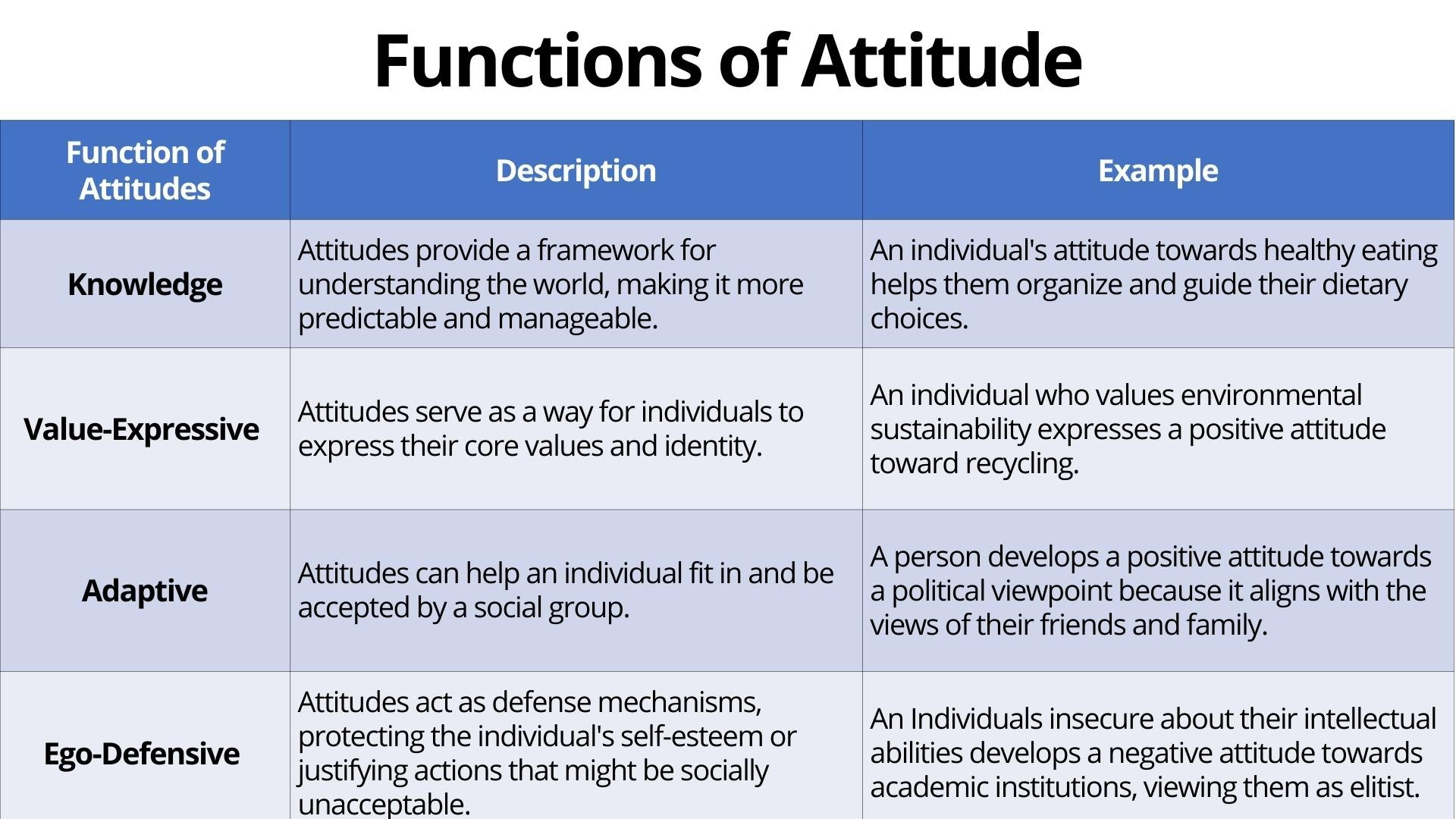
Functions of Attitude Theory
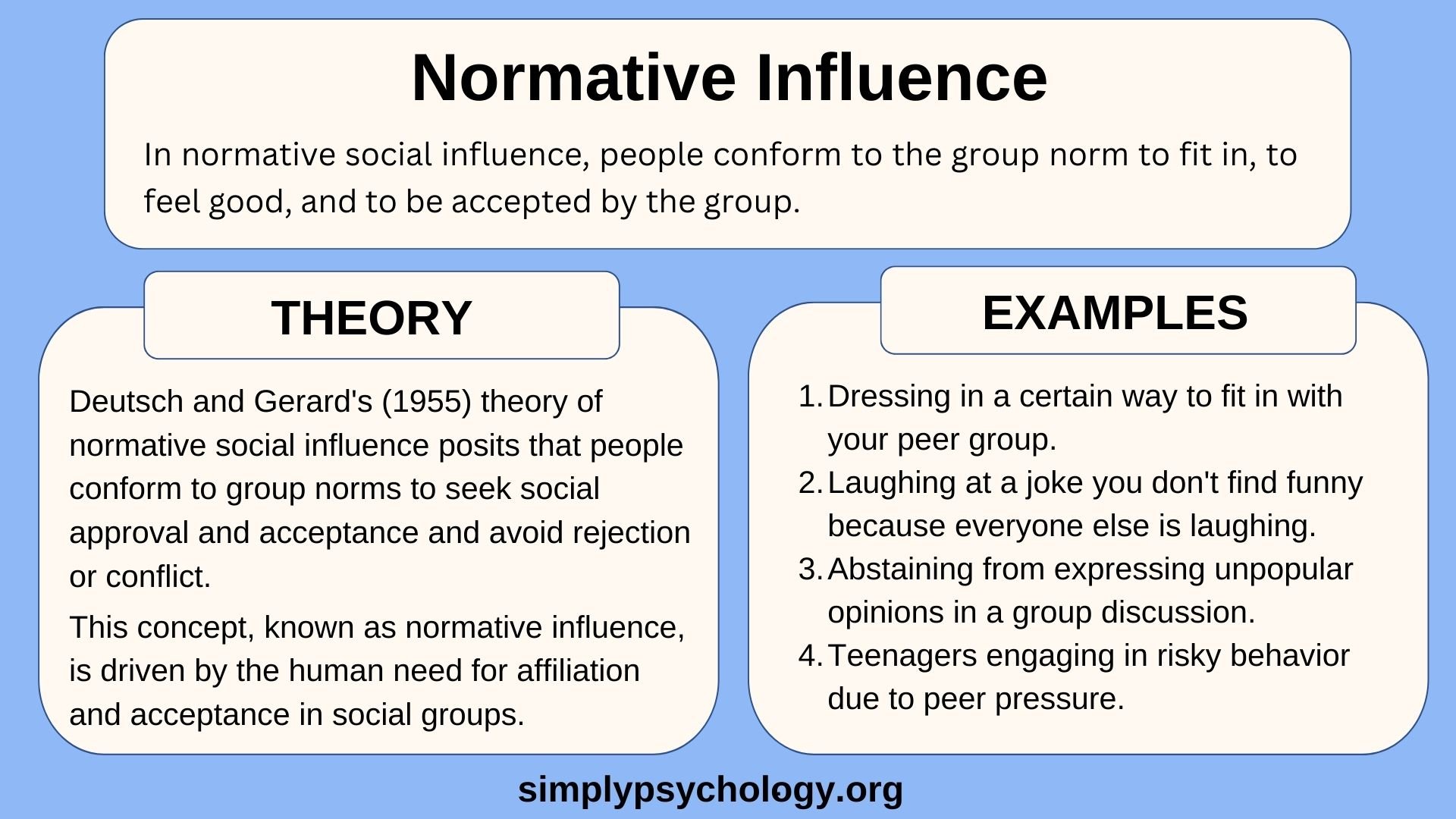
Understanding Conformity: Normative vs. Informational Social Influence

Social Control Theory of Crime

Emotions , Mood , Social Science
Emotional Labor: Definition, Examples, Types, and Consequences

Arousal Theory of Motivation In Psychology: Definition & Examples

Reference Examples
More than 100 reference examples and their corresponding in-text citations are presented in the seventh edition Publication Manual . Examples of the most common works that writers cite are provided on this page; additional examples are available in the Publication Manual .
To find the reference example you need, first select a category (e.g., periodicals) and then choose the appropriate type of work (e.g., journal article ) and follow the relevant example.
When selecting a category, use the webpages and websites category only when a work does not fit better within another category. For example, a report from a government website would use the reports category, whereas a page on a government website that is not a report or other work would use the webpages and websites category.
Also note that print and electronic references are largely the same. For example, to cite both print books and ebooks, use the books and reference works category and then choose the appropriate type of work (i.e., book ) and follow the relevant example (e.g., whole authored book ).
Examples on these pages illustrate the details of reference formats. We make every attempt to show examples that are in keeping with APA Style’s guiding principles of inclusivity and bias-free language. These examples are presented out of context only to demonstrate formatting issues (e.g., which elements to italicize, where punctuation is needed, placement of parentheses). References, including these examples, are not inherently endorsements for the ideas or content of the works themselves. An author may cite a work to support a statement or an idea, to critique that work, or for many other reasons. For more examples, see our sample papers .
Reference examples are covered in the seventh edition APA Style manuals in the Publication Manual Chapter 10 and the Concise Guide Chapter 10
Related handouts
- Common Reference Examples Guide (PDF, 147KB)
- Reference Quick Guide (PDF, 225KB)
Textual Works
Textual works are covered in Sections 10.1–10.8 of the Publication Manual . The most common categories and examples are presented here. For the reviews of other works category, see Section 10.7.
- Journal Article References
- Magazine Article References
- Newspaper Article References
- Blog Post and Blog Comment References
- UpToDate Article References
- Book/Ebook References
- Diagnostic Manual References
- Children’s Book or Other Illustrated Book References
- Classroom Course Pack Material References
- Religious Work References
- Chapter in an Edited Book/Ebook References
- Dictionary Entry References
- Wikipedia Entry References
- Report by a Government Agency References
- Report with Individual Authors References
- Brochure References
- Ethics Code References
- Fact Sheet References
- ISO Standard References
- Press Release References
- White Paper References
- Conference Presentation References
- Conference Proceeding References
- Published Dissertation or Thesis References
- Unpublished Dissertation or Thesis References
- ERIC Database References
- Preprint Article References
Data and Assessments
Data sets are covered in Section 10.9 of the Publication Manual . For the software and tests categories, see Sections 10.10 and 10.11.
- Data Set References
- Toolbox References
Audiovisual Media
Audiovisual media are covered in Sections 10.12–10.14 of the Publication Manual . The most common examples are presented together here. In the manual, these examples and more are separated into categories for audiovisual, audio, and visual media.
- Artwork References
- Clip Art or Stock Image References
- Film and Television References
- Musical Score References
- Online Course or MOOC References
- Podcast References
- PowerPoint Slide or Lecture Note References
- Radio Broadcast References
- TED Talk References
- Transcript of an Audiovisual Work References
- YouTube Video References
Online Media
Online media are covered in Sections 10.15 and 10.16 of the Publication Manual . Please note that blog posts are part of the periodicals category.
- Facebook References
- Instagram References
- LinkedIn References
- Online Forum (e.g., Reddit) References
- TikTok References
- X References
- Webpage on a Website References
- Clinical Practice References
- Open Educational Resource References
- Whole Website References
Appointments at Mayo Clinic
- Stress management
Positive thinking: Stop negative self-talk to reduce stress
Positive thinking helps with stress management and can even improve your health. Practice overcoming negative self-talk with examples provided.
Is your glass half-empty or half-full? How you answer this age-old question about positive thinking may reflect your outlook on life, your attitude toward yourself, and whether you're optimistic or pessimistic — and it may even affect your health.
Indeed, some studies show that personality traits such as optimism and pessimism can affect many areas of your health and well-being. The positive thinking that usually comes with optimism is a key part of effective stress management. And effective stress management is associated with many health benefits. If you tend to be pessimistic, don't despair — you can learn positive thinking skills.
Understanding positive thinking and self-talk
Positive thinking doesn't mean that you ignore life's less pleasant situations. Positive thinking just means that you approach unpleasantness in a more positive and productive way. You think the best is going to happen, not the worst.
Positive thinking often starts with self-talk. Self-talk is the endless stream of unspoken thoughts that run through your head. These automatic thoughts can be positive or negative. Some of your self-talk comes from logic and reason. Other self-talk may arise from misconceptions that you create because of lack of information or expectations due to preconceived ideas of what may happen.
If the thoughts that run through your head are mostly negative, your outlook on life is more likely pessimistic. If your thoughts are mostly positive, you're likely an optimist — someone who practices positive thinking.
The health benefits of positive thinking
Researchers continue to explore the effects of positive thinking and optimism on health. Health benefits that positive thinking may provide include:
- Increased life span
- Lower rates of depression
- Lower levels of distress and pain
- Greater resistance to illnesses
- Better psychological and physical well-being
- Better cardiovascular health and reduced risk of death from cardiovascular disease and stroke
- Reduced risk of death from cancer
- Reduced risk of death from respiratory conditions
- Reduced risk of death from infections
- Better coping skills during hardships and times of stress
It's unclear why people who engage in positive thinking experience these health benefits. One theory is that having a positive outlook enables you to cope better with stressful situations, which reduces the harmful health effects of stress on your body.
It's also thought that positive and optimistic people tend to live healthier lifestyles — they get more physical activity, follow a healthier diet, and don't smoke or drink alcohol in excess.
Identifying negative thinking
Not sure if your self-talk is positive or negative? Some common forms of negative self-talk include:
- Filtering. You magnify the negative aspects of a situation and filter out all the positive ones. For example, you had a great day at work. You completed your tasks ahead of time and were complimented for doing a speedy and thorough job. That evening, you focus only on your plan to do even more tasks and forget about the compliments you received.
- Personalizing. When something bad occurs, you automatically blame yourself. For example, you hear that an evening out with friends is canceled, and you assume that the change in plans is because no one wanted to be around you.
- Catastrophizing. You automatically anticipate the worst without facts that the worse will happen. The drive-through coffee shop gets your order wrong, and then you think that the rest of your day will be a disaster.
- Blaming. You try to say someone else is responsible for what happened to you instead of yourself. You avoid being responsible for your thoughts and feelings.
- Saying you "should" do something. You think of all the things you think you should do and blame yourself for not doing them.
- Magnifying. You make a big deal out of minor problems.
- Perfectionism. Keeping impossible standards and trying to be more perfect sets yourself up for failure.
- Polarizing. You see things only as either good or bad. There is no middle ground.
Focusing on positive thinking
You can learn to turn negative thinking into positive thinking. The process is simple, but it does take time and practice — you're creating a new habit, after all. Following are some ways to think and behave in a more positive and optimistic way:
- Identify areas to change. If you want to become more optimistic and engage in more positive thinking, first identify areas of your life that you usually think negatively about, whether it's work, your daily commute, life changes or a relationship. You can start small by focusing on one area to approach in a more positive way. Think of a positive thought to manage your stress instead of a negative one.
- Check yourself. Periodically during the day, stop and evaluate what you're thinking. If you find that your thoughts are mainly negative, try to find a way to put a positive spin on them.
- Be open to humor. Give yourself permission to smile or laugh, especially during difficult times. Seek humor in everyday happenings. When you can laugh at life, you feel less stressed.
- Follow a healthy lifestyle. Aim to exercise for about 30 minutes on most days of the week. You can also break it up into 5- or 10-minute chunks of time during the day. Exercise can positively affect mood and reduce stress. Follow a healthy diet to fuel your mind and body. Get enough sleep. And learn techniques to manage stress.
- Surround yourself with positive people. Make sure those in your life are positive, supportive people you can depend on to give helpful advice and feedback. Negative people may increase your stress level and make you doubt your ability to manage stress in healthy ways.
- Practice positive self-talk. Start by following one simple rule: Don't say anything to yourself that you wouldn't say to anyone else. Be gentle and encouraging with yourself. If a negative thought enters your mind, evaluate it rationally and respond with affirmations of what is good about you. Think about things you're thankful for in your life.
Here are some examples of negative self-talk and how you can apply a positive thinking twist to them:
| Negative self-talk | Positive thinking |
|---|---|
| I've never done it before. | It's an opportunity to learn something new. |
| It's too complicated. | I'll tackle it from a different angle. |
| I don't have the resources. | Necessity is the mother of invention. |
| I'm too lazy to get this done. | I couldn't fit it into my schedule, but I can re-examine some priorities. |
| There's no way it will work. | I can try to make it work. |
| It's too radical a change. | Let's take a chance. |
| No one bothers to communicate with me. | I'll see if I can open the channels of communication. |
| I'm not going to get any better at this. | I'll give it another try. |
Practicing positive thinking every day
If you tend to have a negative outlook, don't expect to become an optimist overnight. But with practice, eventually your self-talk will contain less self-criticism and more self-acceptance. You may also become less critical of the world around you.
When your state of mind is generally optimistic, you're better able to handle everyday stress in a more constructive way. That ability may contribute to the widely observed health benefits of positive thinking.
There is a problem with information submitted for this request. Review/update the information highlighted below and resubmit the form.
From Mayo Clinic to your inbox
Sign up for free and stay up to date on research advancements, health tips, current health topics, and expertise on managing health. Click here for an email preview.
Error Email field is required
Error Include a valid email address
To provide you with the most relevant and helpful information, and understand which information is beneficial, we may combine your email and website usage information with other information we have about you. If you are a Mayo Clinic patient, this could include protected health information. If we combine this information with your protected health information, we will treat all of that information as protected health information and will only use or disclose that information as set forth in our notice of privacy practices. You may opt-out of email communications at any time by clicking on the unsubscribe link in the e-mail.
Thank you for subscribing!
You'll soon start receiving the latest Mayo Clinic health information you requested in your inbox.
Sorry something went wrong with your subscription
Please, try again in a couple of minutes
- Forte AJ, et al. The impact of optimism on cancer-related and postsurgical cancer pain: A systematic review. Journal of Pain and Symptom Management. 2021; doi:10.1016/j.jpainsymman.2021.09.008.
- Rosenfeld AJ. The neuroscience of happiness and well-being. Child and Adolescent Psychiatric Clinics of North America. 2019;28:137.
- Kim ES, et al. Optimism and cause-specific mortality: A prospective cohort study. American Journal of Epidemiology. 2016; doi:10.1093/aje/kww182.
- Amonoo HL, et al. Is optimism a protective factor for cardiovascular disease? Current Cardiology Reports. 2021; doi:10.1007/s11886-021-01590-4.
- Physical Activity Guidelines for Americans. 2nd ed. U.S. Department of Health and Human Services. https://health.gov/paguidelines/second-edition. Accessed Oct. 20, 2021.
- Seaward BL. Essentials of Managing Stress. 4th ed. Burlington, Mass.: Jones & Bartlett Learning; 2021.
- Seaward BL. Cognitive restructuring: Reframing. Managing Stress: Principles and Strategies for Health and Well-Being. 8th ed. Burlington, Mass.: Jones & Bartlett Learning; 2018.
- Olpin M, et al. Stress Management for Life. 5th ed. Cengage Learning; 2020.
- A very happy brain
- Being assertive
- Bridge pose
- Caregiver stress
- Cat/cow pose
- Child's pose
- COVID-19 and your mental health
- Does stress make rheumatoid arthritis worse?
- Downward-facing dog
- Ease stress to reduce eczema symptoms
- Ease stress to reduce your psoriasis flares
- Forgiveness
- Job burnout
- Learn to reduce stress through mindful living
- Manage stress to improve psoriatic arthritis symptoms
- Mayo Clinic Minute: Meditation is good medicine
- Mountain pose
- New School Anxiety
- Seated spinal twist
- Standing forward bend
- Stress and high blood pressure
- Stress relief from laughter
- Stress relievers
- Support groups
- Tips for easing stress when you have Crohn's disease
Mayo Clinic does not endorse companies or products. Advertising revenue supports our not-for-profit mission.
- Opportunities
Mayo Clinic Press
Check out these best-sellers and special offers on books and newsletters from Mayo Clinic Press .
- Mayo Clinic on Incontinence - Mayo Clinic Press Mayo Clinic on Incontinence
- The Essential Diabetes Book - Mayo Clinic Press The Essential Diabetes Book
- Mayo Clinic on Hearing and Balance - Mayo Clinic Press Mayo Clinic on Hearing and Balance
- FREE Mayo Clinic Diet Assessment - Mayo Clinic Press FREE Mayo Clinic Diet Assessment
- Mayo Clinic Health Letter - FREE book - Mayo Clinic Press Mayo Clinic Health Letter - FREE book
- Healthy Lifestyle
- Positive thinking Stop negative self-talk to reduce stress
We’re transforming healthcare
Make a gift now and help create new and better solutions for more than 1.3 million patients who turn to Mayo Clinic each year.
How to Create a Social Media Marketing Strategy in 9 Easy Steps [Free Template]
Creating your social media marketing strategy doesn’t need to be painful. Create an effective plan for your business in 9 simple steps.

A social media marketing strategy is a summary of everything you plan to do and hope to achieve on social media. It guides your actions and lets you know whether you’re succeeding or failing.
The more specific your plan is, the more effective it will be. Keep it concise. Don’t make it so lofty and broad that it’s unattainable or impossible to measure.
In this post, we’ll walk you through a nine-step plan to create a winning social media strategy of your own. We’ve even got expert insights from Amanda Wood, Hootsuite’s Senior Manager of Social Marketing.
How to create a social media strategy:
Bonus: Get a free social media strategy template to quickly and easily plan your own strategy. Also use it to track results and present the plan to your boss, teammates, and clients.
What is a social media marketing strategy?
A social media strategy is a document outlining your social media goals, the tactics you will use to achieve them and the metrics you will track to measure your progress.
Your social media marketing strategy should also list all of your existing and planned social media accounts along with goals specific to each platform you’re active on. These goals should align with your business’s larger digital marketing strategy.
Finally, a good social media plan should define the roles and responsibilities within your team and outline your reporting cadence.
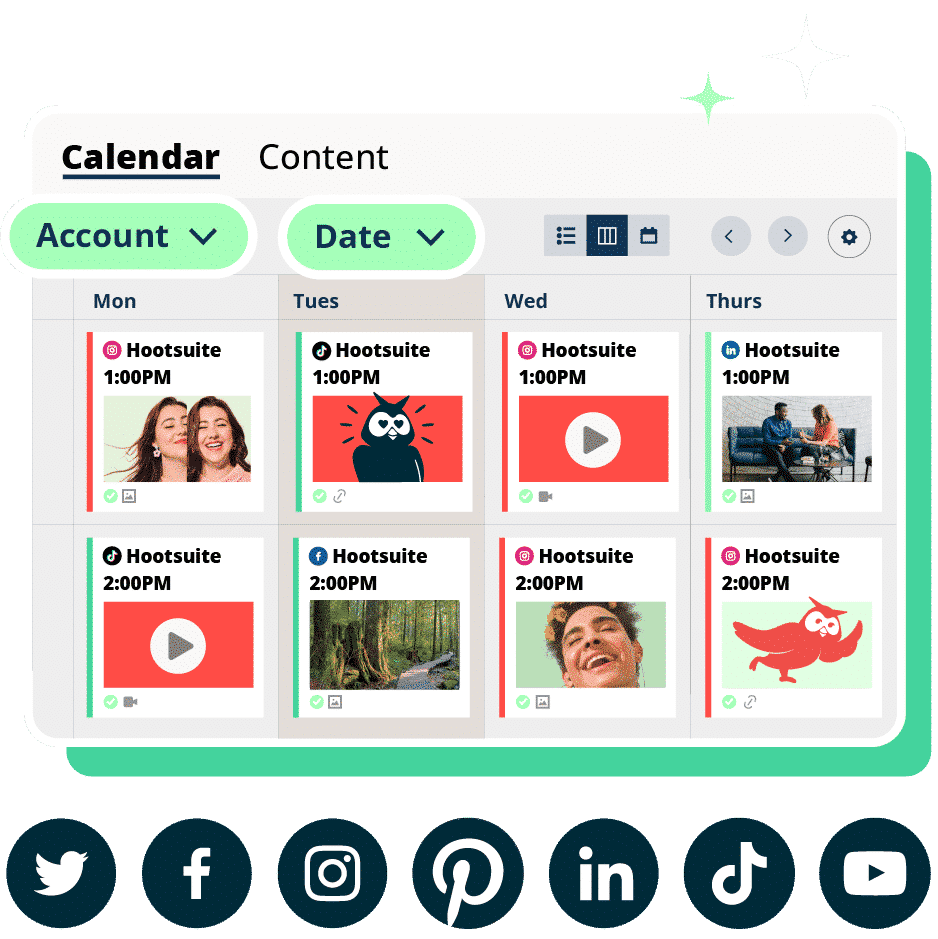
Create. Schedule. Publish. Engage. Measure. Win.
Creating your own social media marketing strategy (video guide)
No time to read the whole article? Let Amanda, Hootsuite’s own Senior Manager of Social Media Marketing, guide you through our free social media marketing strategy template in less than 10 minutes:
How to create a social media marketing strategy in 9 steps
Step 1. choose goals that align to business objectives, set s.m.a.r.t. goals.
The first step to creating a winning social media strategy is to establish clear objectives and goals. Without goals, you have no way to measure success and return on investment (ROI) .
Each of your social media marketing goals should be SMART : s pecific, m easurable, a ttainable, r elevant and t ime-bound.
Psst: Need help getting started? We’ve got social strategy guides for small businesses , financial services , government , higher education , healthcare , real estate , law firms , and non-profits .
Oh, and if you need examples of smart social media goals , we’ve got you covered there too.
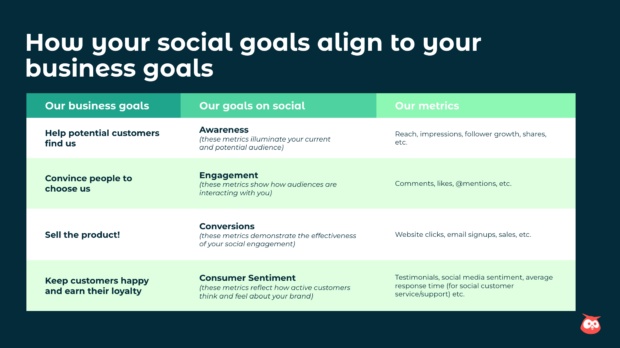
Once you’ve decided on your goals, track them in a social media strategy doc — grab our free template if you don’t have one already.
Track meaningful metrics
Vanity metrics like number of followers and likes are easy to track, but it’s hard to prove their real value. Instead, focus on things like engagement, click-through, and conversion rates.
For inspiration, take a look at these 19 essential social media metrics .
You may want to track different goals for different social media networks, or even different uses for each network.
For example, if you use LinkedIn to drive traffic to your website, you would measure click-throughs. If Instagram is for brand awareness, you might track the number of Instagram Story views. And if you advertise on Facebook, cost-per-click (CPC) is a common success metric.
Social media goals should align with your overall marketing objectives. This makes it easier to show the value of your work and secure buy-in from your boss.
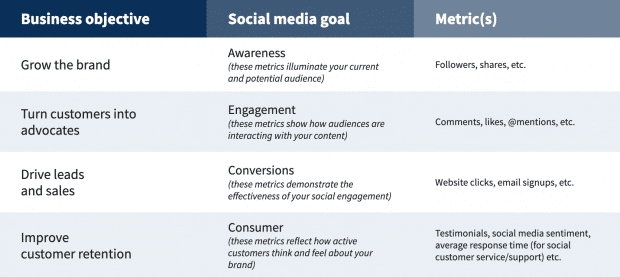
Start developing a successful social media marketing plan by writing down at least three goals for social media.
“ It’s easy to get overwhelmed by deciding what to post and which metrics to track, but you need to focus on what you want to get out of social media to begin with,” says Amanda Wood, Hootsuite’s Senior Manager of Social Marketing. “Don’t just start posting and tracking everything: match your goals to your business, and your metrics to your goals.”
Step 2. Learn everything you can about your audience
Get to know your fans, followers, and customers as real people with real wants and needs, and you will know how to target and engage them on social media.
When it comes to your ideal customer, you should know things like:
- Average income
- Typical job title or industry
Here’s a simple guide and template for creating audience/buyer personas .
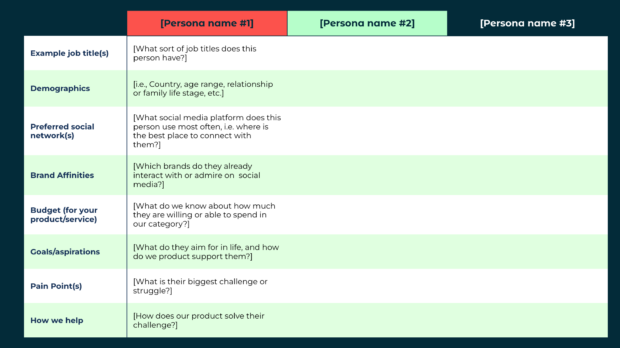
Don’t forget to document this information in your strategy doc!
Social media analytics can also provide a ton of valuable information about who your followers are, where they live, and how they interact with your brand on social media. These insights allow you to refine your strategy and better target your audience.
Jugnoo, an Uber-like service for auto-rickshaws in India, used Facebook Analytics to learn that 90% of their users who referred other customers were between 18- and 34-years-old, and 65% of that group was using Android. They used that information to target their ads, resulting in a 40% lower cost per referral.
Check out our guide to using social media analytics and the tools you need to track them .
Step 3. Get to know your competition
Odds are your competitors are already using social media, and that means you can learn from what they’re doing.
Conduct a competitive analysis
A competitive analysis allows you to understand who the competition is and what they’re doing well (and not so well). You’ll get a good sense of what’s expected in your industry, which will help you set social media targets of your own.
It will also help you spot opportunities and weaknesses you can document in your social strategy doc.
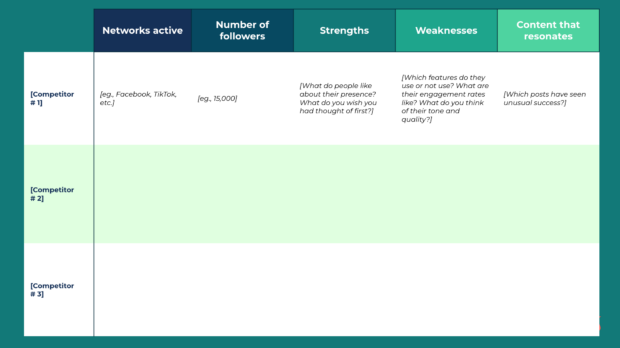
Maybe one of your competitors is dominant on Facebook, for example, but has put little effort into X (Twitter) or Instagram. You might want to focus on the social media platforms where your audience is underserved, rather than trying to win fans away from a dominant player.
Use social media listening
Social listening is another way to keep an eye on your competitors.
Do searches of the competition’s company name, account handles, and other relevant keywords on social media. Find out what they’re sharing and what other people are saying about them. If they’re using influencer marketing, how much engagement do those campaigns earn them?
Pro tip : Use Hootsuite Streams to monitor relevant keywords, hashtags and accounts in real-time.
Try Hootsuite for free. You can cancel anytime.
As you track, you may notice shifts in how your competitors and industry leaders are using social media. You may come across new, exciting trends. You might even spot specific social content or a campaign that really hits the mark—or totally bombs.
Use this kind of intel to optimize and inform your own social media marketing strategy.
Just don’t go overboard on the spy tactics, Amanda advises. “ Make sure you aren’t ALWAYS comparing yourself to the competition — it can be a distraction. I’d say checking in on a monthly basis is healthy. Otherwise, focus on your own strategy and results.”
Step 4. Do a social media audit
If you’re already using social media, take stock of your efforts so far. Ask yourself the following questions:
- What’s working, and what’s not?
- Who is engaging with you?
- What are your most valuable partnerships?
- Which networks does your target audience use?
- How does your social media presence compare to the competition?
Once you collect that information, you’ll be ready to start thinking about ways to improve.
We’ve created an easy-to-follow social media audit guide and template to walk you through each step of this process.
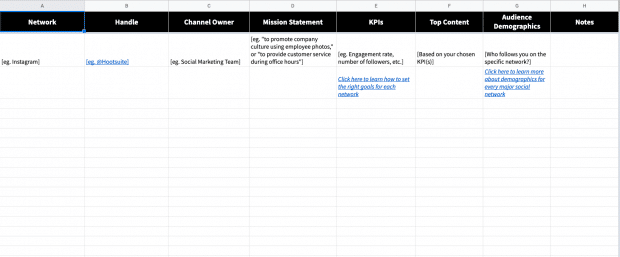
Your audit should give you a clear picture of what purpose each of your social accounts serves. If the purpose of an account isn’t clear, think about whether it’s worth keeping.
To help you decide, ask yourself the following questions:
- Is my audience here?
- If so, how are they using this platform?
- Can I use this account to help achieve my goals?
Asking these tough questions will keep your social media strategy focused.
Look for impostor accounts
During the audit, you may discover fake accounts using your business name or the names of your products.
These imposters can be harmful to your brand—never mind that they’re capturing followers that should be yours.
You may want to get your accounts verified too to ensure your fans know they are dealing with the real you.
Here’s how to get verified on:
- X (Twitter)
Step 5. Set up accounts and improve profiles
Decide which networks to use.
As you decide which social networks to use, you will also need to define your strategy for each.
Benefit Cosmetics’ social media manager, Angela Purcaro, told eMarketer : “For our makeup tutorials … we’re all about Snapchat and Instagram Stories. [X], on the other hand, is designated for customer service.”
Hootsuite’s own social team even designates different purposes for formats within networks. On Instagram, for example, they use the feed to post high-quality educational infographics and product announcements and Stories to cover live events or quick social media updates.
View this post on Instagram A post shared by Hootsuite 🦉 (@hootsuite)
Pro tip : Write out a mission statement for each network. A one-sentence declaration to keep you focused on a specific goal.
Example: “We will use X for customer support to keep email and call volumes down.”
Or: “We will use LinkedIn for promoting and sharing our company culture to help with recruitment and employee advocacy.”
One more: “We will use Instagram to highlight new products and repost quality content from influencers.”
If you can’t create a solid mission statement for a particular social media channel, you may want to ask yourself if it’s worth it.
Note : While larger businesses can and do tackle every platform, small businesses may not be able to — and that’s ok! Prioritize social platforms that will have the most impact on your business and make sure your marketing team has the resources to handle content for those networks. If you need help focusing your efforts, check out our 18-minute social media plan .
Set up your profiles
Once you’ve decided which networks to focus on, it’s time to create your profiles. Or improve existing ones so they align with your strategy.
- Make sure you fill out all profile fields
- Include keywords people would use to search for your business
- Use consistent branding (logos, images, etc.) across networks so your profiles are easily recognizable
Pro tip : Use high-quality images that follow the recommended dimensions for each network. Check out our always-up-to-date social media image size cheat sheet for quick reference.
We’ve also got step-by-step guides for each network to walk you through the process:
- Create a Facebook business page
- Create an Instagram business account
- Create a TikTok account
- Create a X (Twitter) business account
- Create a Snapchat account
- Create a LinkedIn Company Page
- Create a Pinterest business account
- Create a YouTube channel
Don’t let this list overwhelm you. Remember, it’s better to use fewer channels well than to stretch yourself thin trying to maintain a presence on every network.
Optimize your profiles (and content) for search
Never heard of social SEO ? It’s time to learn.
44% of Gen Z consumers use social platforms to research their purchase decisions, which means it’s extra critical that your channels are optimized for social search.
That means making sure your profile names are clear and descriptive, you’re including relevant hashtags and keywords in your bio and on every post, and you’re using features like alt text and captions to include your target keywords as naturally as possible.
Step 6. Find inspiration
While it’s important that your brand be unique, you can still draw inspiration from other businesses that are great on social.
“ I consider it my job to stay active on social: to know what’s trending, which campaigns are winning, what’s new with the platforms, who’s going above and beyond,” says Amanda. “This might be the most fun step for you, or the hardest one, but it’s just as crucial as the rest of them.”
Social media success stories
You can usually find these on the business section of the social network’s website. ( Here’s Facebook’s , for example.)
Case studies can offer valuable insights that you can apply to your own social media plan.
Award-winning accounts and campaigns
You could also check out the winners of The Facebook Awards or The Shorty Awards for examples of brands that are at the top of their social media game.
For learning and a laugh, check out Fridge-Worthy, Hootsuite’s bi-weekly awards show highlighting brands doing smart and clever things on social media.
Your favorite brands on social media
Who do you enjoy following on social media? What do they do that compels people to engage and share their content?
National Geographic, for example, is one of the best on Instagram, combining stunning visuals with compelling captions.
View this post on Instagram A post shared by National Geographic (@natgeo)
Then there’s Shopify. The ecommerce brand uses Facebook to sell themselves by showcasing customer stories and case studies.
And Lush Cosmetics is a great example of superior customer service on X. They use their 280 characters to answer questions and solve problems in an extremely charming and on-brand way.

Source: lushcosmetics on X
Notice that each of these accounts has a consistent voice, tone, and style. That’s key to letting people know what to expect from your feed. That is, why should they follow you? What’s in it for them?
Consistency also helps keep your content on-brand even if you have multiple people on your social media team.
For more on this, read our guide on establishing a compelling brand voice on social media .
Ask your followers
Consumers can also offer social media inspiration.
What are your target customers talking about online? What can you learn about their wants and needs?
If you have existing social channels, you could also ask your followers what they want from you. Just make sure that you follow through and deliver what they ask for.
Step 7. Create a social media content calendar
Sharing great content is essential, of course, but it’s equally important to have a plan in place for when you’ll share content to get the maximum impact.
Your social media content calendar also needs to account for the time you spend interacting with the audience (although you need to allow for some spontaneous engagement as well).
Set your posting schedule
Your social media content calendar lists the dates and times at which you will publish types of content on each channel. It’s the perfect place to plan all of your social media activities—from images, link sharing, and re-shares of user-generated content to blog posts and videos. It includes both your day-to-day posting and content for social media campaigns.
Your calendar also ensures your posts are spaced out appropriately and published at the best times to post .
Pro tip: You can plan your whole content calendar and get recommended best times to post on every network based on your past engagement rate, impressions, or link click data in Hootsuite.
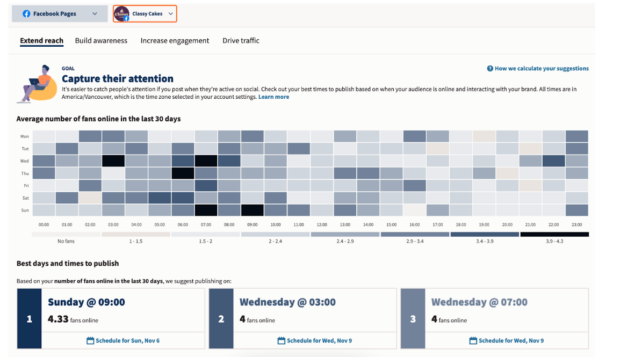
Hootsuite’s Best Time to Publish feature
Determine the right content mix
Make sure your content strategy and calendar reflect the mission statement you’ve assigned to each social profile, so that everything you post is working to support your business goals.
(We know, it’s tempting to jump on every meme, but there should always be a strategy behind your social media marketing efforts!)
You might decide that:
- 50% of content will drive traffic back to your website
- 25% of content will be curated from other sources
- 20% of content will support lead-generation goals (newsletter sign-ups, ebook downloads, etc.)
- 5% of content will be about your company culture
Placing these different post types in your content calendar will ensure you maintain the right mix.
If you’re starting from scratch and you’re not sure what types of content to post, try the 80-20 rule :
- 80% of your posts should inform, educate, or entertain your audience
- 20% can directly promote your brand.
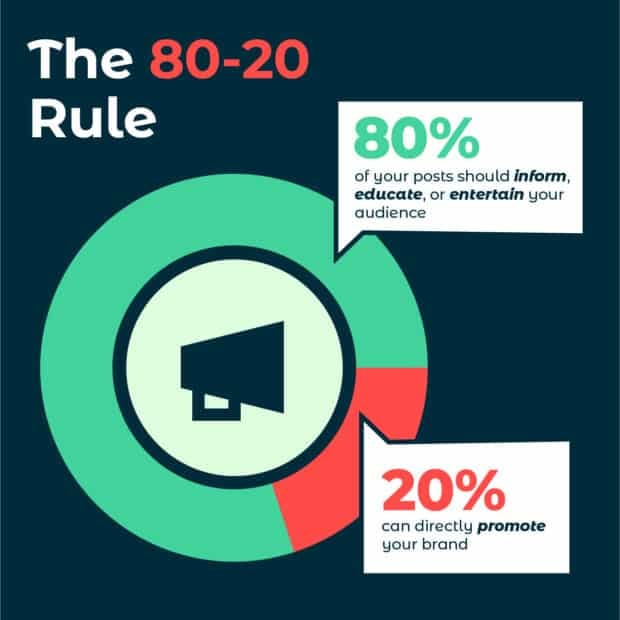
You could also try the social media content marketing rule of thirds :
- One-third of your content promotes your business, converts readers, and generates profit.
- One-third of your content shares ideas and stories from thought leaders in your industry or like-minded businesses.
- One-third of your content is personal interactions with your audience

Whatever you decide on, be sure to document it in your strategy doc.
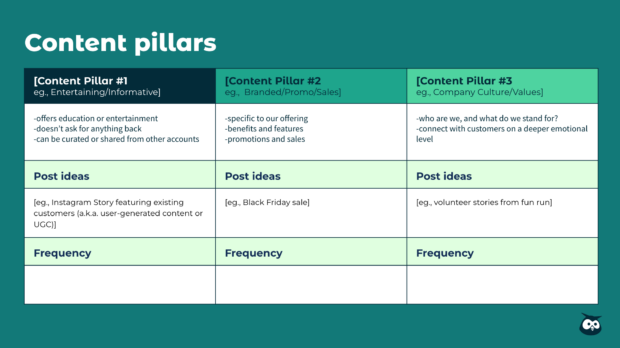
Don’t post too much or too little
If you’re starting a social media marketing strategy from scratch, you may not have figured out how often to post to each network for maximum engagement yet.
Post too frequently and you risk annoying your audience. But, if you post too little, you risk looking like you’re not worth following.
Start with these posting frequency recommendations:
- Instagram (feed): 3-7 times per week
- TikTok: 3-5 times per week
- Facebook: 1-2 times per day
- X (Twitter): 1-5 times per day
- LinkedIn: 1-5 times per day
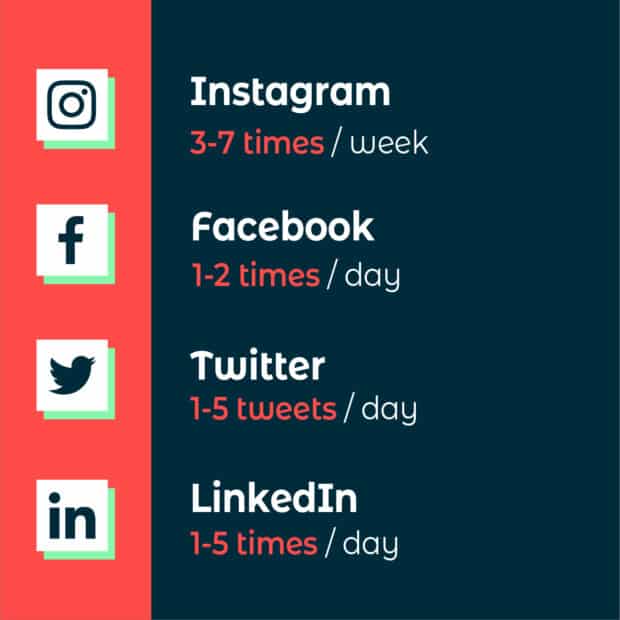
Pro tip : Once you have your social media content calendar planned out, use a scheduling tool to prepare messages in advance rather than updating constantly throughout the day.
We might be biased, but we think Hootsuite is the best social media management tool. You can schedule social media posts to every network and the intuitive calendar view gives you a full picture of all your social activity each week.
Try It Free
Step 8. Create compelling content
Remember those mission statements you created for each channel in Step 5? Well, it’s time to go a bit deeper, a.k.a. provide some examples of the type of content you’ll post to fulfill your mission on each network.
If you’re not sure what to post, here’s a long list of social media content ideas to get you started. Or (to make it even easier) you can use an AI tool like OwlyWriter to generate on-brand content in a flash.
The idea here is to:
- Keep your content aligned with the purpose of each network;
- Show other stakeholders (if applicable) what kind of content they can expect to see on each network.
This last point especially will help you avoid any tension when your colleagues want to know why you haven’t posted their case study/whitepaper/blog post to TikTok yet. It’s not in the strategy, Linda!
Ideally, you will generate content types that are both suited to the network and the purpose you’ve set out for that network.
For example, you wouldn’t want to waste time posting brand awareness tweets if you’ve designated X/Twitter for primarily customer support. And you wouldn’t want to post super polished corporate video ads to TikTok, as users expect to see short, unpolished videos on that platform.
It might take some testing over time to figure out which type of content works best on which type of network, so prepare to update this section frequently.
We won’t lie: content creation isn’t as easy as everyone not on the social team seems to think. But if you’re struggling, Amanda suggests going back to basics.
The first question to ask is: is there cohesion between your content types? Is your content providing value? Do you have a good mix of entertaining, or educational content? What does it offer that makes a person stop and spend time? Creating a few different content pillars or categories that encompass different aspects of storytelling for your brand, and what you can offer your audience is a good start.
This brings us to Step 9.
Step 9. Track performance and make adjustments
Your social media marketing strategy is a hugely important document for your business, and you can’t assume you’ll get it exactly right on the first try.
As you start to implement your plan and track your results, you may find that some strategies don’t work as well as you’d anticipated, while others are working even better than expected.
That’s why it’s important to document your progress along the way.
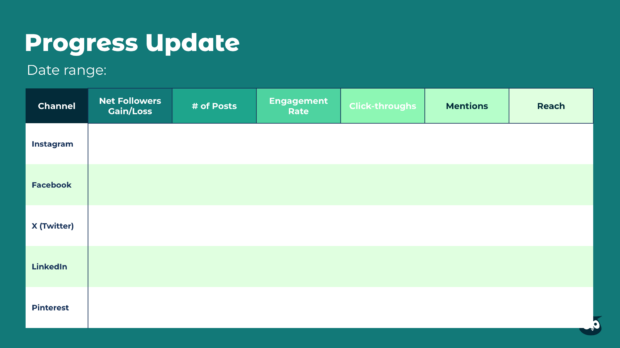
Look at performance metrics
In addition to the analytics within each social network (see Step 2), you can use UTM parameters to track social visitors as they move through your website, so you can see exactly which social posts drive the most traffic to your website.
Benchmark your results
You’ve got your numbers, but how do they stack up to the competition in your industry? Industry benchmarks are a great way to evaluate your performance against other businesses in your category.
If you’ve got Hootsuite Analytics , you can use our built-in social media benchmarking tool to compare the performance of your social accounts against the average of brands in your industry with just a couple of clicks.
You can set up custom timeframes, switch between networks — Instagram, Facebook, X (Twitter), LinkedIn, and TikTok — and look up benchmarks for metrics like followers, audience growth rate, engagement rate, clicks, shares, and much more.
You’ll also find resources to improve your performance right in the summary section:

Re-evaluate, test, and do it all again
Once this data starts coming in, use it to re-evaluate your strategy regularly. You can also use this information to test different posts, social marketing campaigns, and strategies against one another. Constant testing allows you to understand what works and what doesn’t, so you can refine your social media marketing strategy in real time.
You’ll want to check the performance of all your channels at least once a week and get to know the basics of social media reporting so you can track your growth over time.
Pro tip: If you use Hootsuite, you can review the performance of all your posts on every network in one place. Once you get the hang of checking your analytics, you may even want to customize different reports to show specific metrics over a variety of different time periods.
Surveys can also be a great way to find out how well your social media strategy is working. Ask your followers, email list, and website visitors whether you’re meeting their needs and expectations, and what they’d like to see more of. Then make sure to deliver on what they tell you.
Finalizing your social media strategy
Spoiler alert: nothing is final.
Social media moves fast. New networks emerge, others go through demographic shifts.
Your business will go through periods of change as well.
All of this means that your social media marketing strategy should be a living document that you review and adjust as needed. Refer to it often to stay on track, but don’t be afraid to make changes so that it better reflects new goals, tools, or plans.
When you update your social strategy, make sure to watch our 5-step video on how to updating your social media strategy for 2024:
Social media strategy template
Ready to start documenting? Grab your free social media strategy template below!

What’s next? When you’re ready to put your plan into action, we’re here to help…
Save time managing your social media marketing strategy with Hootsuite. From a single dashboard you can easily:
- Plan, create, and schedule posts to every network
- Track relevant keywords, topics, and accounts
- Stay on top of engagement with a universal inbox
- Get easy-to-understand performance reports and improve your strategy as needed
Try Hootsuite for Free
With files from Shannon Tien .
Do it better with Hootsuite , the all-in-one social media tool. Stay on top of things, grow, and beat the competition.
Become a better social marketer.
Get expert social media advice delivered straight to your inbox.
Christina Newberry is an award-winning writer and editor whose greatest passions include food, travel, urban gardening, and the Oxford comma—not necessarily in that order.
Amanda Wood is a senior social marketing professional who combines analytical and creative thinking to build brands.
As head of social at Hootsuite, Amanda oversees the global social strategy encompassing organic and paid social on Instagram, Facebook, Twitter, TikTok, and LinkedIn, a social engagement and listening strategy, and an employee advocacy program.
As the leader of a high-performing social team, she has extensive experience collaborating with creatives to bring campaigns to life on social and drive business results.
Related Articles

How To Set and Exceed Social Media Goals [9 Examples]
Struggling with structuring your efforts on social? Set yourself up for success with our guide to setting and achieving smarter social media goals.

How to Run the Easiest Social Media Audit [FREE TEMPLATE]
A social media audit is the best way to review and improve any social marketing strategy. Check in on your efforts with this free template.

How to Create a Social Media Calendar and Stay Organized
Social media content calendars are the best way to plan and organize your content. Build one in 4 easy steps or use our free templates.

Social Media Marketing Tools: The Complete Guide
Automate your work, save time, and build better relationships with your audience by using the right social media marketing tools.

IMAGES
VIDEO
COMMENTS
How to write a psychology personal statement. Here are some steps to help you write your personal statement: 1. Read the instructions thoroughly. The first step to writing an effective personal statement is to know what your audience expects from your essay. Take time to read the essay instructions for all the institutions for which you plan to ...
Psychology Personal Statement Example 5. Psychology has been a part of my life indirectly for many years, from something as insignificant as people watching in a cafe to an impromptu counselling session for a friend with emotional trauma. I have had a real desire to work with people for a long time and have always been fascinated with human ...
Example: UNC-CH Personal Statement Prompt § On a separate page, write a personal statement that includes the following: • a. Description of any work experience relevant to psychology and research (bibliographic, laboratory or other) that you may have done (or are doing) either as part of employment or to complete your present program.
Customize each personal statement to the program or school you are applying. Elaborate on how that particular program can assist you in reaching your goals. During revisions, pay attention to the strength and dynamism of your opening paragraph. Your goal is to hook the readers and give them the desire to keep reading.
Remember that a personal statement should be written to persuade the admissions tutor that you're a good fit for the course and have the skills to succeed. Put yourself in their shoes and think about what would convince you. Be honest but avoid false modesty. Sell yourself as a future psychologist in the making.
Degree Course Quiz. Find the ideal university course for you in minutes by taking our degree matchmaker quiz today. Browse our range of Psychology personal statement examples. Gain inspiration & make sure you're on the right track when writing your own personal statement.
This is an example personal statement for a Masters degree application in Psychology. See our guide for advice on writing your own postgraduate personal statement. The effects of psychological trauma can be diffuse and difficult to treat, with wide-ranging causes and an unfortunate range of symptoms. Having witnessed first-hand the consequences ...
The University of Bristol highlights five elements of a strong, academically focused psychology statement: Ensure it is well structured and well written. Give details of any specific interests or ambitions you have that relate to the content of the course. Demonstrate your enthusiasm for psychological research as a focus for academic study.
A Personal Statement is a professional essay that outlines your interest for the field, relevant experiences, career goals, and fit to the program and or faculty member in which you are applying. Psychology and Psychological Sciences majors apply for a myriad of applied-masters, doctoral, and professional programs. ...
In your psychology graduate degree application, the personal statement is crucial. It showcases your academic achievements, personal journey, career goals, and why you're a great fit for the program. This is your chance to move beyond mere statistics—GPA, test scores, work experience—and tell your unique story.
Nearly all doctoral programs and many master's degree programs in psychology require submission of a personal statement as part of the application package. In my experience advising students as well as serving as a graduate dean for many years, few things in the application process cause students as much anxiety and prompt so many questions.
This Personal Statement for Psychology is a great example of demonstrating academic interest and initiative. The candidate's interest and passion are clearly shown which is vital to Admissions Tutors. Remember, at Oxford, these Admissions Tutors are often the people who will be teaching you for the next few years, so you need to appeal ...
6. Conclude with a clear summary. Just like the introduction, a good conclusion to your psychology personal statement can leave a lasting impression on the reader. Try to cover all the important points that you have mentioned in a clear, concise way. Avoid too many fluffy, long sentences and stick to the point.
General Outline. Opening Paragraph - 4 to 6 sentences. Academic Accomplishments - 5 to 7 sentences. Research Experience - 5 to 8 sentences. Employment/Volunteer Work/Clinical Experience - 5 to 8 sentences. Future Plans/Goodness-of-Fit - 6 to 9 sentences. Concluding Paragraph - 4 to 5 sentences. (Information adapted for the purposes ...
undergraduate psychology programs provide appropriate advising and mentoring concerning graduate school culture and the requirements of the graduate school application process, their majors are likely to commit these KODs. For example, an unmentored psychology major may interpret a personal statement at face value by perceiving it as an
Eye on Psi Chi, 1(1), 14-15. Merry Sleigh, PhD, earned her BA in psychology and English from James Madison University (VA). In 1996, she received her PhD in developmental psychology from Virginia Tech, with a specialization in prenatal and infant development. She first served as faculty advisor to Psi Chi at George Mason University (VA), where ...
How to write a personal psychology statement. Here are some steps to help you write your statement: 1. Read the instructions thoroughly. Knowing what your audience wants from your essay is the first step in producing an excellent personal statement. Take the time to read all the essay directions for the schools to which you intend to apply.
1. Don't overemphasize personal details. A letter that focuses on your own personal traumas and history will only go so far. Sure, it is often the case that someone has a significant personal ...
Next Steps: Drafting & Structuring Your Psychology Personal Statement. Try to narrow your interests down to 2 or 3 topic areas which you can use as overarching themes for your personal statement, e.g. (1) Theories of Mind, of Consciousness, (2) Psychology & Gender, (3) Social Psychology - Group Identity.
A personal statement is a short essay of around 500-1,000 words, in which you tell a compelling story about who you are, what drives you, and why you're applying. ... The Media Psychology program stands out to me as the perfect environment for this kind of research, given its researchers' openness to collaboration across diverse fields. ...
A personal statement for a psychology conversion course isn't significantly different from an application for any other subject. You'll still be expected to discuss your reasons for choosing the course and particular institution, as well as your relevant skills and experience along with your career goals. In addition, you will also need to ...
Show passion. We want to know where this interest in psychology comes from, what excites you and how you indulge your passion. Simply saying: "I have always been interested in psychology" is meaningless without presenting any evidence. Demonstrate how this interest has manifested itself and what you have done to take it further.
Psychotherapy and Counselling: Practices and Principles Personal Statement. I have always desired to understand feelings, behaviour and the human mind; always been driven toward solving the questions that start with why. However, after leading many spontaneous counselling sessions with friends, witnessing the empowering feeling it brings to ...
The American Psychological Association (APA) is a scientific and professional organization that represents psychologists in the United States. APA educates the public about psychology, behavioral science and mental health; promotes psychological science and practice; fosters the education and training of psychological scientists, practitioners and educators; advocates for psychological ...
The term 'self-efficacy" was first coined by psychologist Albert Bandura (1977), a Canadian-American psychologist and a professor at Stanford University. He originally proposed the concept, in his own words, as a personal judgment of "how well one can execute courses of action required to deal with prospective situations".
More than 100 reference examples and their corresponding in-text citations are presented in the seventh edition Publication Manual.Examples of the most common works that writers cite are provided on this page; additional examples are available in the Publication Manual.. To find the reference example you need, first select a category (e.g., periodicals) and then choose the appropriate type of ...
A therapist has a master's degree in a mental health-related field such as psychology, counseling psychology or family therapy. They're qualified to evaluate a person's mental health and use therapeutic techniques, such as talk therapy. Examples of therapists include licensed social workers and licensed professional clinical counselors.
It's unclear why people who engage in positive thinking experience these health benefits. One theory is that having a positive outlook enables you to cope better with stressful situations, which reduces the harmful health effects of stress on your body.
Use 'I' statements "I think all communication should start with 'I feel,'" Gabb states. If you lead with superlative or accusatory statements (like "you always" or "you never ...
Remember those mission statements you created for each channel in Step 5? Well, it's time to go a bit deeper, a.k.a. provide some examples of the type of content you'll post to fulfill your mission on each network. If you're not sure what to post, here's a long list of social media content ideas to get you started.